Aug 10 – 2025. Jungto Dharma School Graduation Ceremony, Sutra Course Graduation Ceremony, Balsim Practitioner Ordination Ceremony
Hello. Today is a meaningful day as students who have completed their five-month studies at the Jungto Dharma School and Sutra Course move forward to new beginnings.

Without time to recover from the fatigue of the Northeast Asian History Tour, Sunim immediately attended the Jungto Dharma School graduation ceremony at 10 a.m. About 400 people gathered at the Jungto Social and Cultural Center, including offline class graduates and perfect attendance award recipients from the basic and live broadcast classes.
After reciting the Three Refuges and Words for Practice together, Jeon Hae-jong, President of Jungto Society, delivered congratulatory remarks and a progress report.
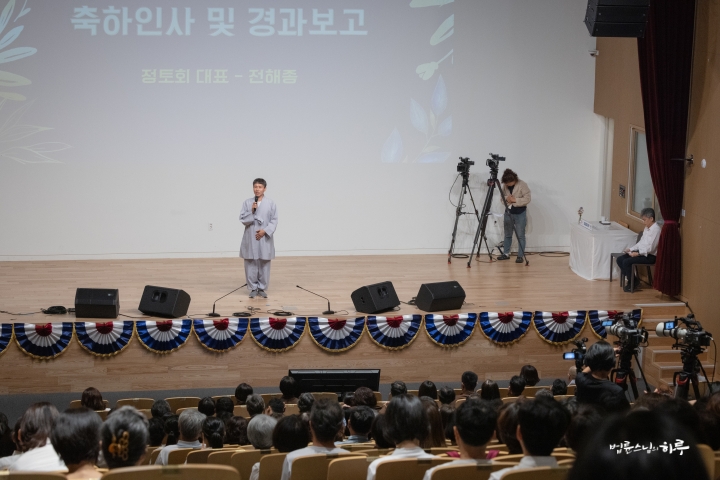
“I graduated from Jungto Dharma School 17 years ago. After graduation, I attended the Awakening Retreat and entered the 1000-Day Practice, dedicating myself to daily practice. At that time, my daughter was in third grade. Through the process of practice, I was able to confidently tell my daughter that ‘life doesn’t have to be painful, you can live happily.’ Graduation is a new beginning. I encourage you to become members of Jungto Society and continue practicing and volunteering together.”
Next, to celebrate the Jungto Dharma School graduation, the offline class facilitators and class volunteers performed a congratulatory performance. They sang “Our Dream” and put on an energetic show.
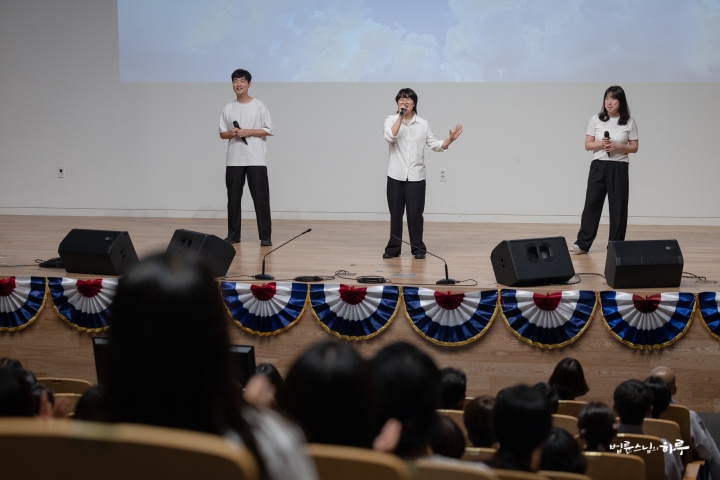
The performance clearly showed how much the volunteers celebrated the students’ graduation. Next, everyone watched a video titled “Our Story” looking back on the past five months of the Jungto Dharma School program.
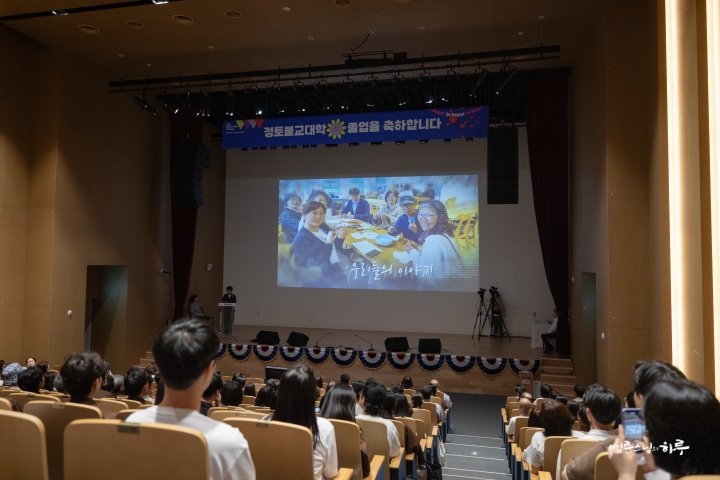
Seeing the Dharma School students participating in various online and offline activities was deeply moving. The graduates gave a round of applause to thank the Dharma Teachers and volunteers who ran the Dharma School with dedication.
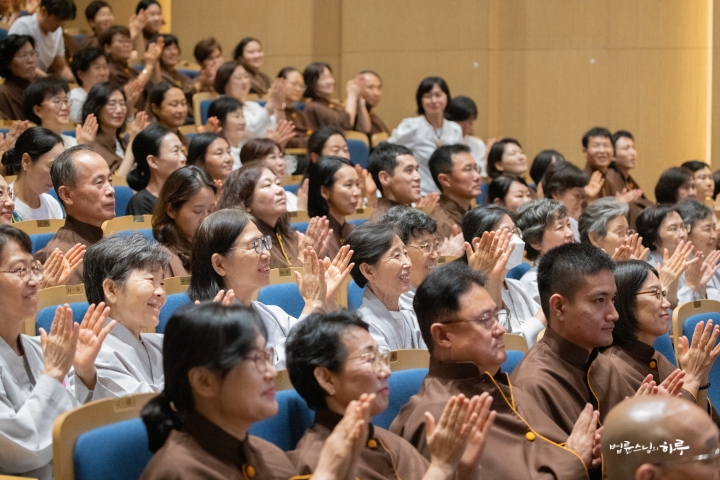
Next was the diploma presentation. There are about 1,600 graduates from the March 2025 Jungto Dharma School, including those from overseas. Today, three graduates representing all of them came on stage to receive their diplomas.
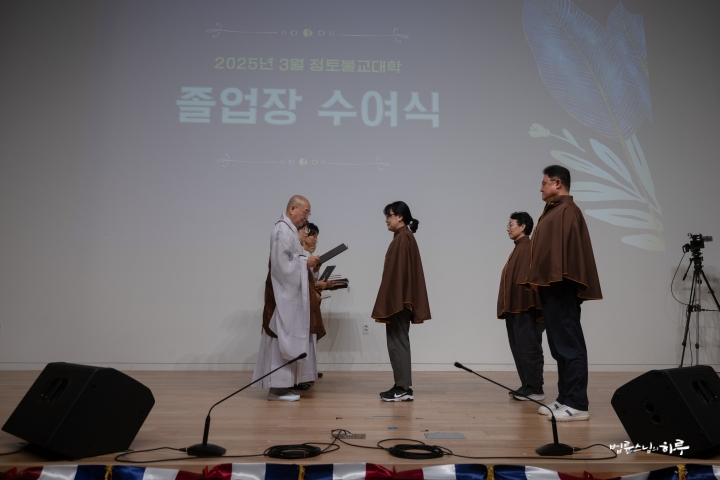
The diplomas were presented directly by Venerable Pomnyun Sunim, the dean of Jungto Dharma School.
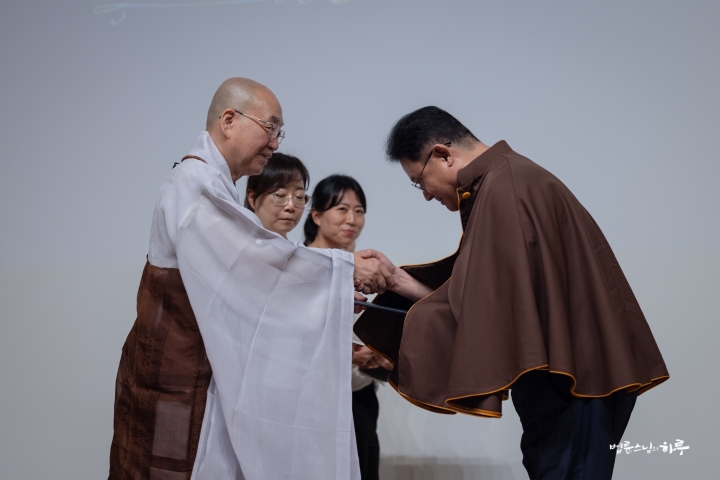
Everyone gave a round of applause to congratulate all those graduating from Jungto Dharma School. Next, after presenting the perfect attendance awards, the near-perfect attendance awards were given. About 200 people received perfect attendance awards, and 220 people received near-perfect attendance awards. The names of the perfect and near-perfect attendance award recipients were displayed on screen.
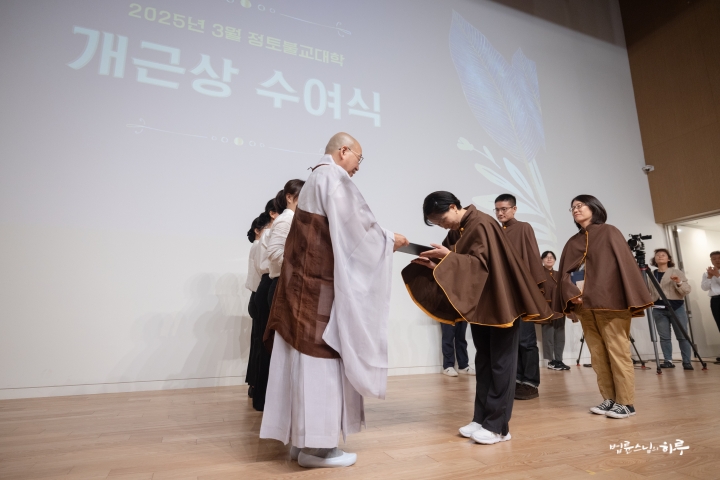
The representative recipients took a commemorative photo with Sunim in the center of the stage. Once again, congratulatory applause was given to all who received perfect and near-perfect attendance awards.
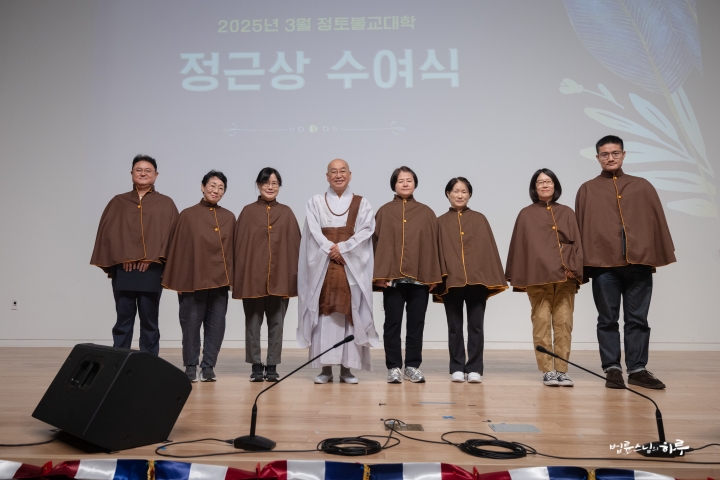
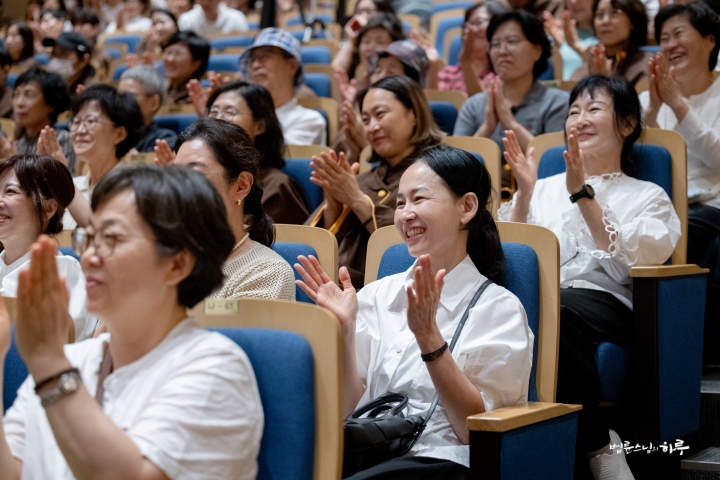
Next, graduation reflections were shared by those who experienced life changes while attending Dharma School. Six graduates came on stage and shared the changes brought by their year of learning and practice with calm yet profound voices. While their stories were all different, they had one thing in common: they had deeply faced themselves and taken a step toward freedom from suffering.
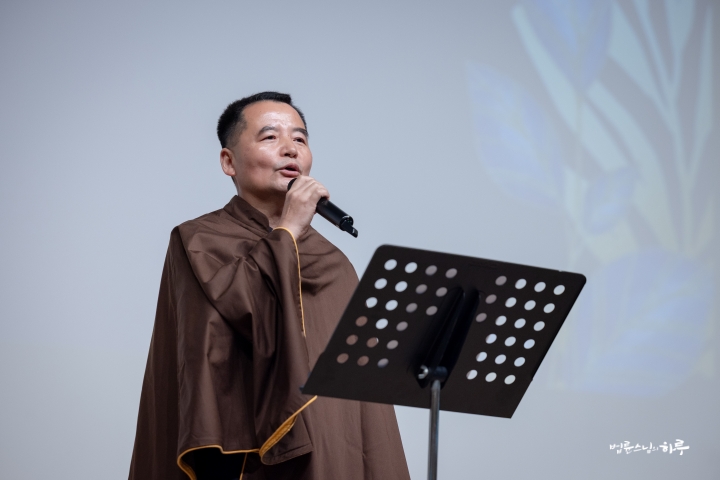
“While doing 108 prostrations, memories from the past came up. But suddenly I thought, ‘So what?’ and experienced facing the past. Realizing that the past is just memories, experiences, and shadows, I no longer became bound by it. I also learned that death is not the end of life but a quiet pause in the continuation of life. Now I hope to just live and be aware when death comes.”
“At the Awakening Retreat, I saw myself. I was someone who empathized deeply with others’ emotions and was easily shaken because of it. I realized that I had been suppressing emotions and getting hurt for over 30 years working in civil complaints. The realization that ‘the only person who can make me angry is myself’ became a powerful weapon, allowing me to escape from work-related tension. Now I will strive to live a free life as my own master, not controlled by anything.”
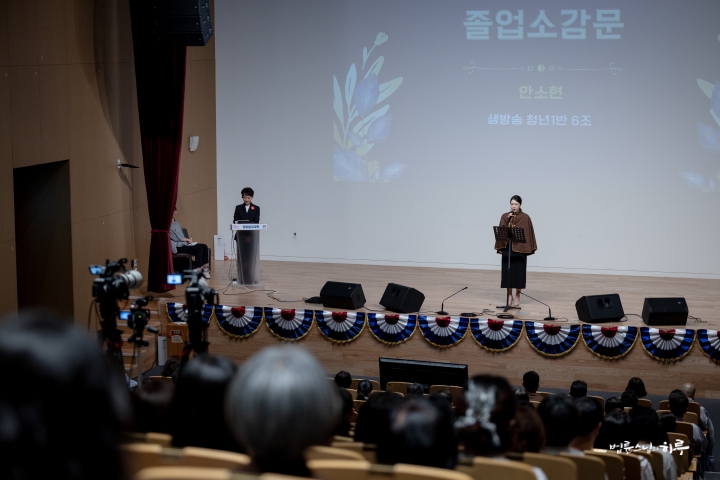
“Through the classes, I learned that suffering is something I create. Loss also comes from thinking ‘I lost something that was mine,’ but I questioned whether it was really mine. After hearing the Buddha’s words, ‘Where is there a house where no one has died?’ I realized I had been drowning in suffering over something that everyone born must inevitably experience.”
“In my relationship with my mother, I realized how strong my belief that ‘I am right’ was. While doing 108 prostrations every morning, I practiced letting go of that thought and tried to accept my mother as she is. Then I began to see the pain she must have felt. Before, I was only absorbed in my own pain, but now I’ve become interested in others’ pain as well.”
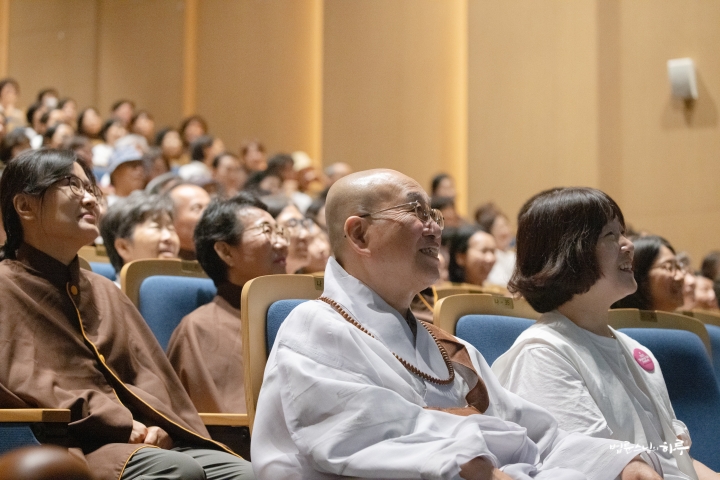
“I learned to feel emotions without being swept away by them, to step back and observe. Learning the principle of Dharma that everything arises and ceases according to causes and conditions, with no fixed essence within, made each day feel vivid and precious. As I became precious to myself, others became precious too, and the world approached me more warmly. Entrusting everything to the Dharma became not emptiness but a foundation of possibility, making my mind lighter and more peaceful.”
“As I continued practicing, I began to reveal my heart during sharing time, and by looking at myself as I am, I felt lighter. Having experienced reduced suffering through learning and practicing the Dharma, I now take the Three Refuges sincerely, not just as a formality. With more ease, I gained self-confidence, and volunteer work, which used to seem like someone else’s story, now feels like something I really want to try.”
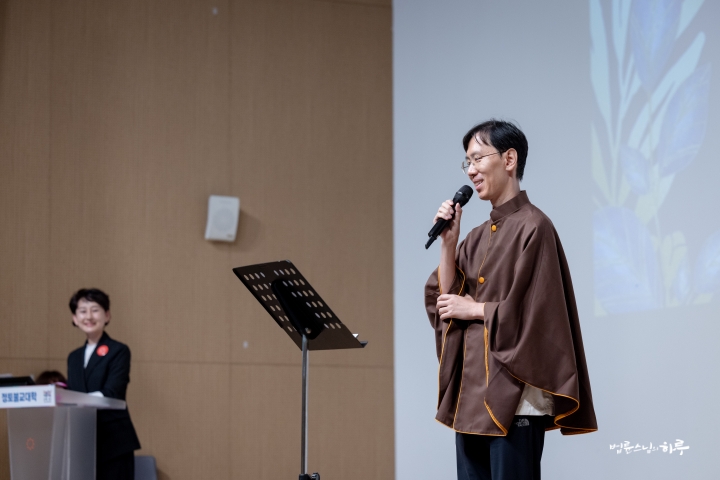
The six graduates entered Jungto Dharma School for different reasons, but all gained wisdom through learning and practice to break free from past wounds and attachments, resolve conflicts in relationships, and handle emotions and suffering. Hoping these reflections would become seeds of change for others, everyone gave a big round of applause to those who shared.
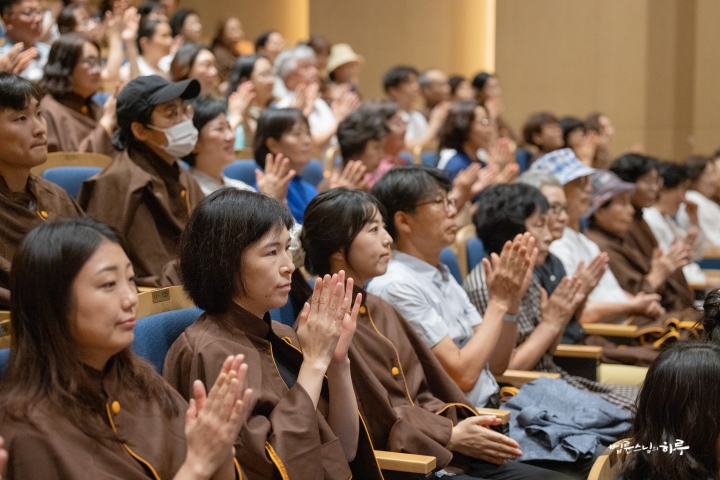
Next, a bouquet was presented to Venerable Pomnyun Sunim with the grateful hearts of the Dharma School students.
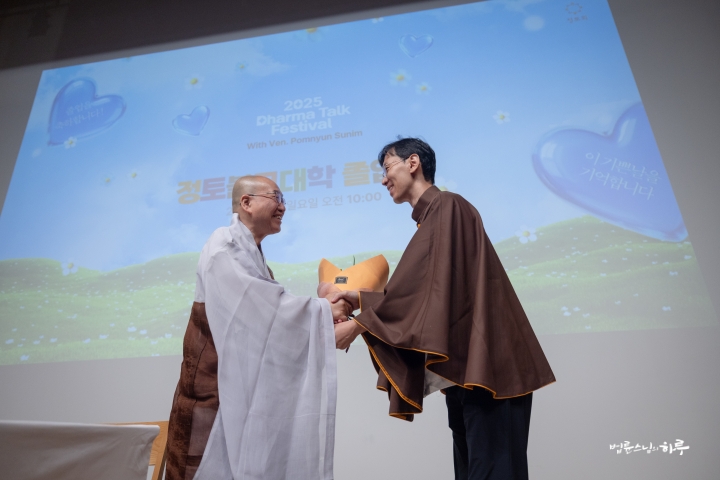
Then everyone sang “Teacher’s Grace” together with gratitude to Venerable Pomnyun Sunim for guiding them with the right Dharma. The graduates present also stood up and expressed their gratitude with loud applause.
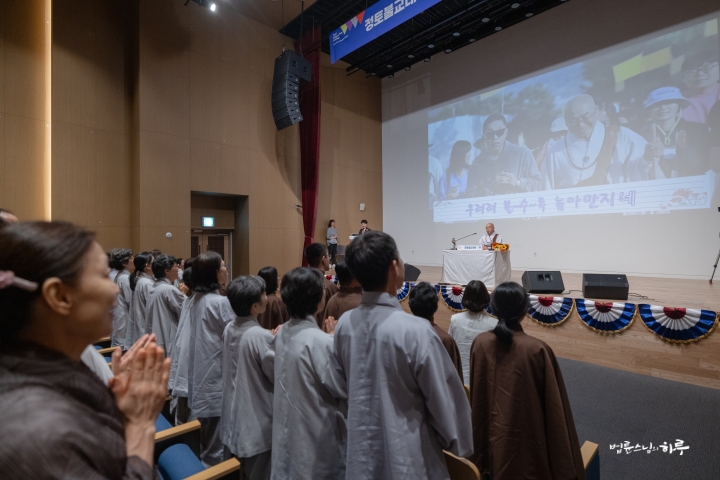
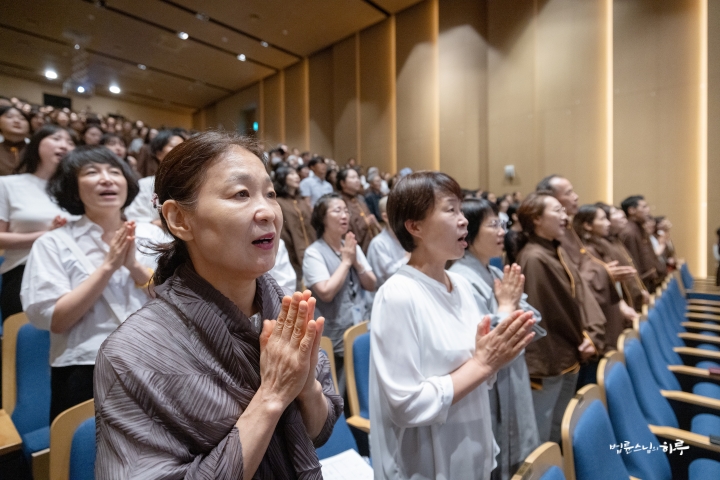
The graduates requested a graduation Dharma talk from Sunim with three prostrations. Sunim reviewed what was learned at Jungto Dharma School and spoke about how graduates should continue their practice going forward.
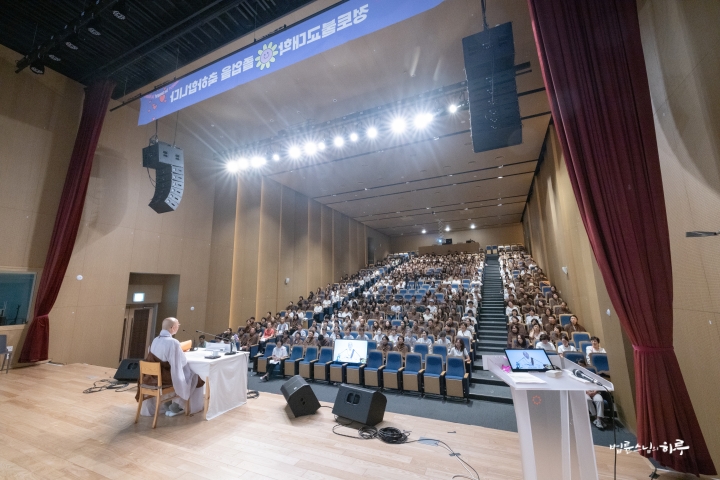
“First, I congratulate you on your graduation. This time, in addition to the regular online Jungto Dharma School lectures, there were those who attended lectures in person during the 100-Day Dharma Talk period, and those who attended through video. Thus, this learning was conducted in three different formats.
While graduating from Jungto Dharma School is known to be difficult, seeing all of you who have studied consistently despite busy daily lives and reached graduation today makes me think you are truly admirable. Among you are those who achieved perfect and near-perfect attendance. Even setting aside the learning content, just maintaining consistent attendance and participation is already significant practice.
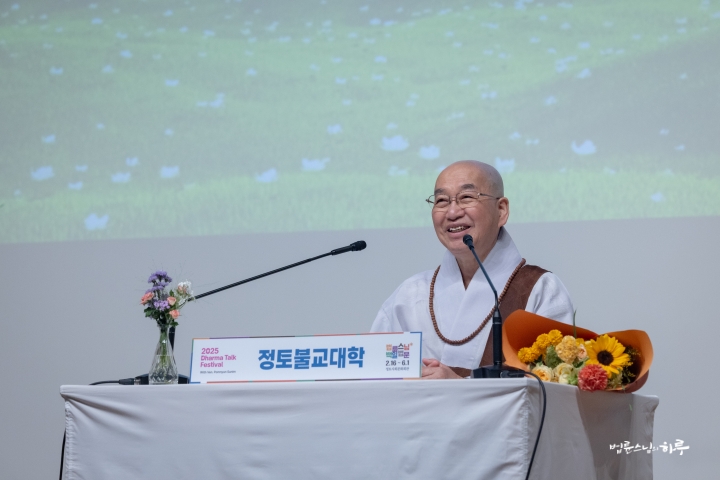
How Not to Cling to Pleasure or Fall into Suffering
The core topic we studied over the past five months was ‘Can I live without suffering?’ You might wonder, ‘How can a person live without suffering?’ Even if we cannot live completely without suffering, through continued study we could feel our suffering decrease. If suffering decreased under the same conditions, we think ‘If I study more, suffering will decrease further,’ and hope arises that ‘Someday I might be able to live without suffering.’
A life without suffering is called Nirvana in Sanskrit, and ‘yeolban’ in Korean. The meaning is ‘a state without suffering.’ Health means not being sick, and happiness means having no suffering. However, we often mistake pleasure for happiness. But suffering inevitably follows pleasure. When we realize that making pleasure our happiness brings the unhappiness of suffering, we also understand that life is samsara – a cycle of suffering and pleasure. Therefore, the standard of happiness should not be pleasure, but a state without suffering.
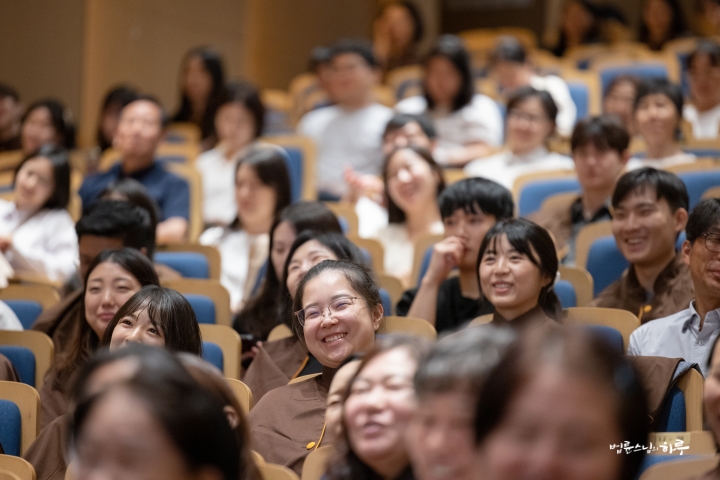
A state without suffering is a state of mental tranquility. When you realize this truth, you won’t be swept away by pleasure when it comes. This is because you know that suffering inevitably follows as a price. Conversely, when suffering comes, you won’t be swept away by it either. Since you’ve already anticipated it, its magnitude diminishes. People say that anticipating difficulties makes them anxious, but that’s because they try to avoid them. When you naturally accept difficulties, even that suffering becomes smaller.
For example, when you borrow money from someone, you feel happy at that moment, but the fact that you must repay it someday becomes a source of suffering. If you try not to repay it, you’ll fear that creditors might come looking for you. However, if you think it’s natural to repay, you can return it with gratitude, saying, “Thank you for letting me use it all this time.” Nirvana is a state where you don’t borrow in the first place, so there’s no need to repay. And if you do borrow, you must naturally repay. When you understand this principle, even if you borrow money, you’ll gladly repay it, and even the cycle of rebirth won’t be frightening.
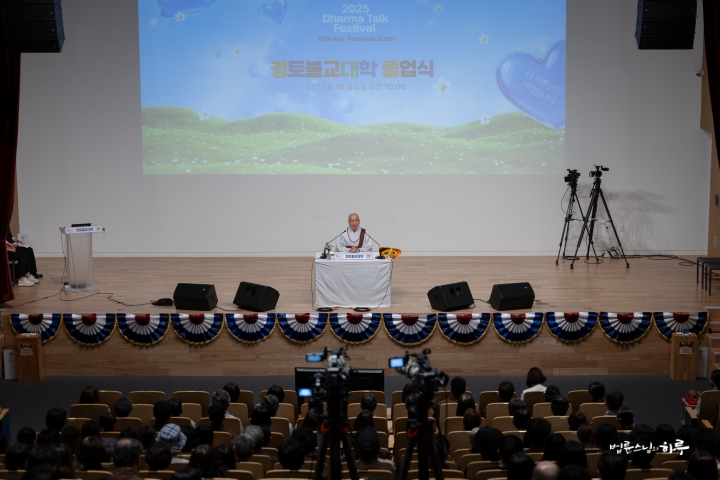
Why Do We Suffer?
To move toward a state free from suffering, we must first examine our current state. If we have a lot of stress or feel anxious and restless, we are in a state of suffering. So why do we suffer? First, it’s because we want everything to go our way. However, the world doesn’t work according to our desires. The point isn’t “don’t want anything,” but rather to have the mindset of “it’s fine if it happens, and it’s fine if it doesn’t.” Getting what we want isn’t necessarily good, and not getting it isn’t necessarily bad. What’s important is having a mind that doesn’t get elated when we get what we want and doesn’t get discouraged when we don’t.
Second, we tend to act according to our temperament. Sometimes our temper takes precedence over our interests. Life is the most important value, yet when we lose our temper, we’re not even afraid of death. There are cases where someone threatens us with a knife, and we stick out our belly saying, “Go ahead, stab me!” This happens because our temper overrides our interests.
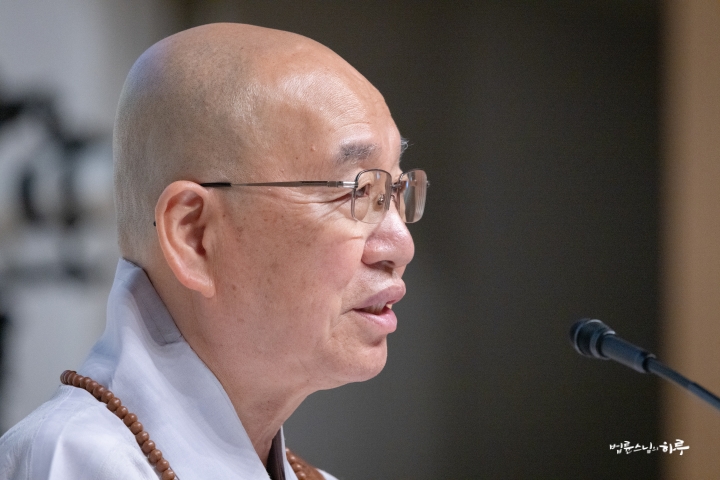
Third is ignorance. This is when we act thinking we’re right without knowing whether something is poison or medicine, good or bad. However, when we look back later, the losses are often enormous. The common voice phishing scams these days happen because of momentary ignorance. Such fleeting ignorance can bring tremendous losses.
The fundamental cause of all these things is attachment. The desire to do something itself isn’t the problem; the problem is the attachment that we must do it. If we can let go of this attachment—the three poisons of desire(貪), anger(瞋), and ignorance(癡)—even just a little, there will be nothing to suffer about. The things that happen in life are just natural occurrences, like what happens in nature when we go to the mountains. Therefore, there’s nothing to suffer about.
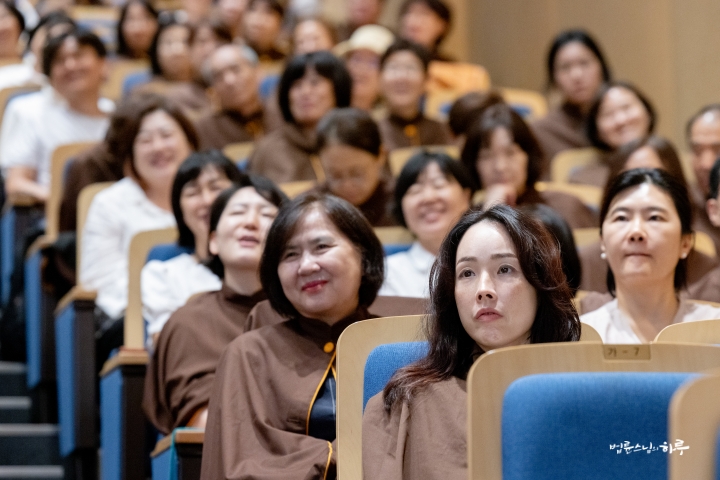
How to Live Without Suffering, Being the Master of Your Own Life
So how can we maintain a state free from suffering? We must always be awake. In other words, we must maintain ‘awareness.’
At Jungto Dharma School, you have learned about the Four Noble Truths and the Noble Eightfold Path, which contain these teachings. You have learned about the law of dependent origination, which shows that all beings in the world are interconnected, and about cause and effect over time. You have also learned how suffering and pleasure, as well as knowing, are formed, and studied the twelve sense bases, the eighteen realms, and the five aggregates. When you understand how these work in daily life, rather than simply knowing them as intellectual concepts, you can identify the causes when suffering arises. If you want to suffer, you can continue living as you are; if you want to be free from suffering, you can choose not to live that way. Your destiny is not predetermined but depends on your choices. Then, even when you desire something, you won’t be consumed by it.
The first goal of Jungto Dharma School is to live without suffering. The second goal is to live as the master of your own life. When you achieve this, the tendency to blame or resent others diminishes. In this world, success and failure are not separate entities. If things go well, that’s good; if they don’t, you can study the situation and try again. Sometimes failure becomes the foundation for even greater success. When you’re no longer attached to winning or losing, your mind gains spaciousness. This is what we have been studying together so far.
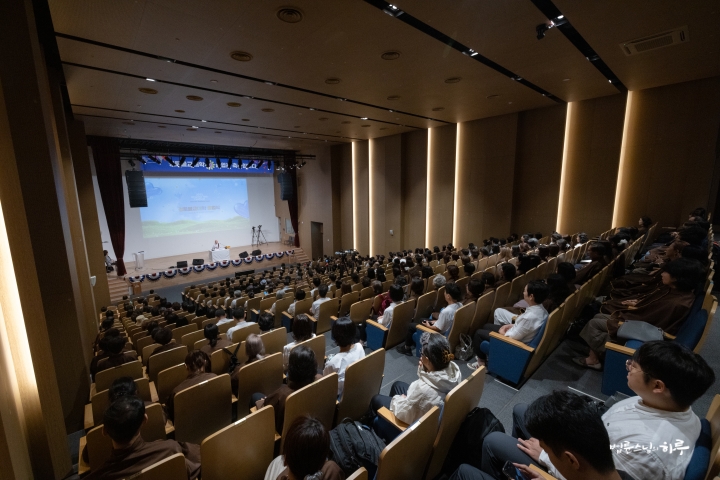
Taking the First Step Opens the Path
You have now taken your first step. This means you have entered the ultimate path. There is an old saying from ancient masters: ‘The road in front of your house leads to the capital.’ Just as the road in front of your house leads to Seoul, taking the first step in practice is like entering the path toward enlightenment. You can say that you have now taken your first step as a practitioner. Now you must take the second step, then the third step forward.
The important point here is that sometimes we think we have taken the first step, but in reality, we haven’t moved at all. Just now in the reflection essays, someone said, ‘I have taken my first step,’ but in fact, there are cases where people are standing in the same place without actually stepping forward, living in an illusion. It is important to actually take that first step. Only then can you move away from where you have been staying until now.
When facing difficulties, receiving someone’s help to feel comfortable – this is the typical form of religion. We expect to escape suffering by receiving help when we have no money, or when someone lifts us up after we fall. However, practice is different. Practice is about awakening from our ignorance and opening our own eyes to directly escape from suffering. Therefore, someone’s help is not necessarily required. There is only a guide who helps us open our eyes. We call this person a teacher.
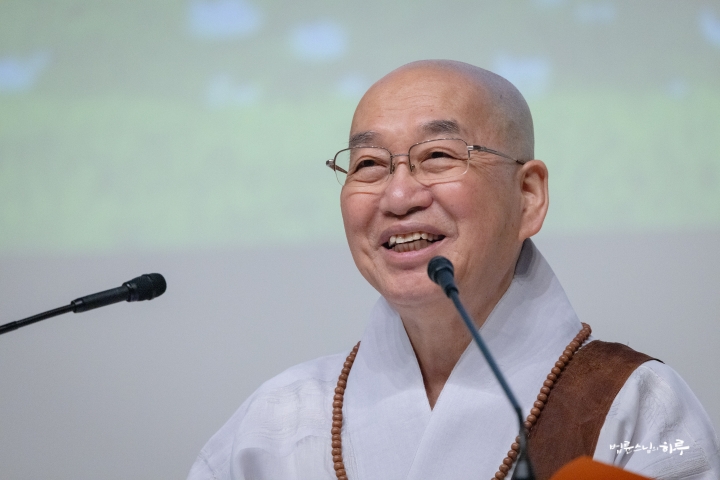
Knowing and Experiencing Are Different
When you actually open your eyes and experience freedom from suffering, things that were previously difficult to believe, no matter how much you wanted to, become firmly believable through experience. Even when told ‘Don’t touch it because it’s hot,’ you might still think, ‘Maybe it would be okay to touch it?’ But once you actually touch it and realize it’s truly hot, no matter how much someone encourages you, you won’t touch it again. The reason faith wavers is because you haven’t experienced it yet. So if you learned in the Jungto Buddhism Course that enlightenment is the path of practice, you need to directly experience that taste at the Awakening Retreat. The Awakening Retreat is the program where you can experience the enlightenment you learned about in the Jungto Buddhism Course.
If the door to your mind has opened a little through mind practice, now you need to open it more deeply. While you may have developed some awareness, you need to be more detailed and deeply aware. To do this, it’s good to attend the Jungto Sutra Course. Also, to deepen your experience of awareness, participating in the Sharing Retreat will be helpful. When you become aware of your own subtle mind, you can better understand others’ minds as well. Because we don’t know our own minds well, we can only guess at others’ minds based on our own thoughts. This is why even couples who have lived together for 30 years don’t really know each other’s inner thoughts. That’s why there’s always some incompleteness or slight distrust and doubt. The Sharing Retreat is the program that fills these gaps.
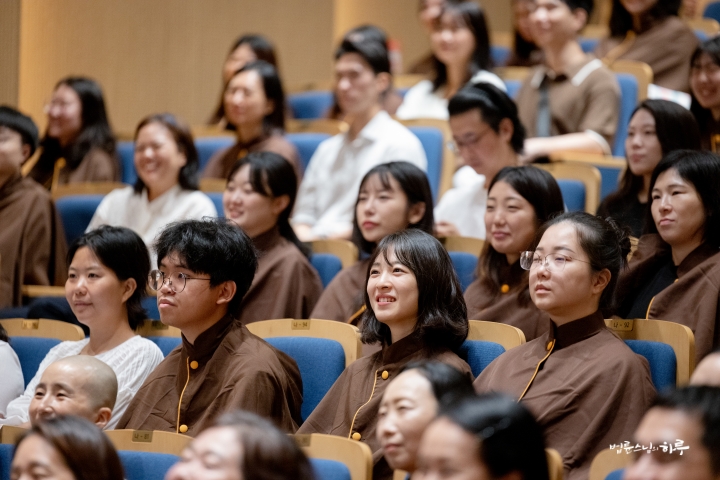
And after graduating from Jungto Dharma School, the program you must attend is the India Pilgrimage. You need to do field study following in the footsteps of the Buddha. Although you say you’ve come to know that the Buddha was a revolutionary, that’s just a story in books. I spent the past week on the Northeast Asian History Tour. The Northeast Asian History Tour has three objectives. First, exploring the historical sites of Goguryeo and Balhae; second, visiting independence movement sites; and third, experiencing the natural environment of the Yalu River, Tumen River, and Mt. Baekdu. The participants thought they already knew everything through lectures, videos, and articles from “A Day in the Life of Sunim,” but when they actually saw the northern lands, buildings, and people in person, and directly encountered Balhae Fortress, Goguryeo Fortress, the General’s Tomb, and the Gwanggaeto Stele, they said it felt completely different. While Sunim’s Dharma talks are moving, the impact of seeing and hearing things firsthand on location is much deeper. This is because transmitting knowledge and transmitting emotion are different. That’s why field study is very important.
If You’ve Taken the First Step, Consistency Is the Answer
But what is even more important than that? If you’ve learned what practice is through Jungto Dharma School, the most important thing going forward is to practice every day. Even if it’s difficult to wake up at 5 AM, it’s important to get up at that time and practice diligently. You need to participate in the 1000-Day Practice and continue your diligent practice. Beginners are likely to quit easily if they practice alone. However, if you participate in the 1000-Day Practice, you check every hundred days whether you actually practiced or not, and you receive encouragement through Dharma talks, which reduces the likelihood of giving up. So to practice consistently, it’s necessary to participate in the 1000-Day Practice.
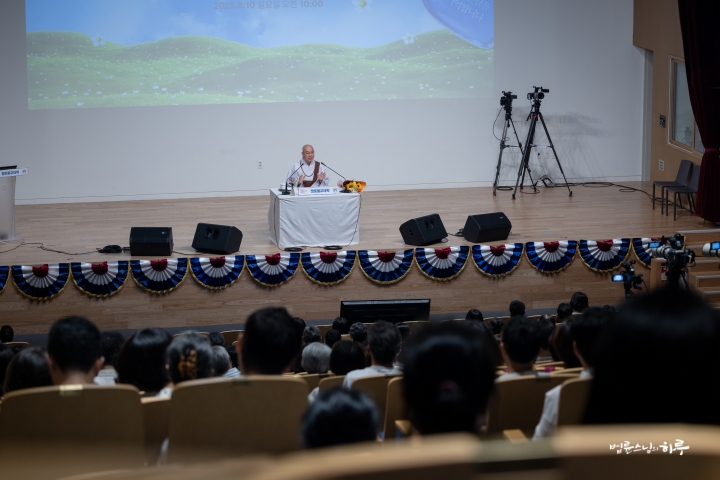
Those who have graduated from Jungto Dharma School are beginners who have taken their first step as practitioners. In other words, they have entered the ranks of practitioners. Therefore, they can become members of Jungto Society. When you become a member of Jungto Society, you are qualified to regularly attend the Weekly Dharma Assembly held every Wednesday. The practice and training programs that Jungto Society members can attend include the Awakening Retreat, Sharing Retreat, and Meditation Retreat. Learning programs include Jungto Dharma School and Jungto Sutra Course, and the Buddhist Social Studies Course is also scheduled to open in the future. Travel programs include the India Pilgrimage and Northeast Asian History Tour. Since there are various programs like these, you can choose and study according to your available time. I look forward to meeting you again at the Weekly Dharma Assembly and Jungto Sutra Course.”
Everyone gave a big round of applause to Sunim for giving a warm Dharma talk for the graduates.
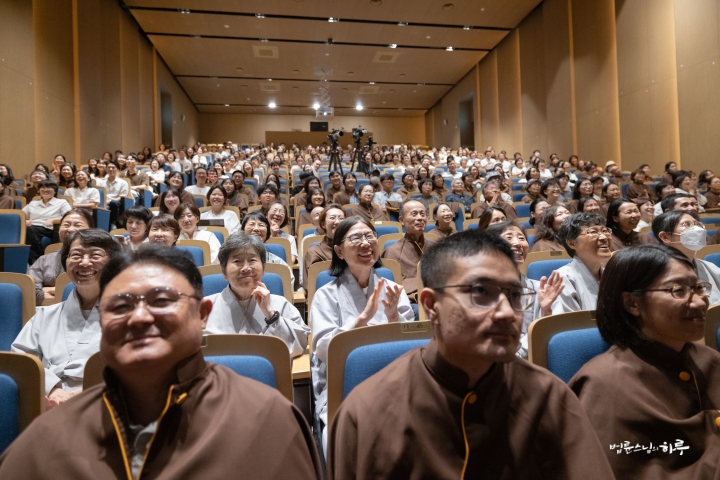
Next, there was a one-minute speech session where any graduate could come forward and share what they wanted to say. Following the host’s guidance, graduates took turns giving their one-minute speeches.
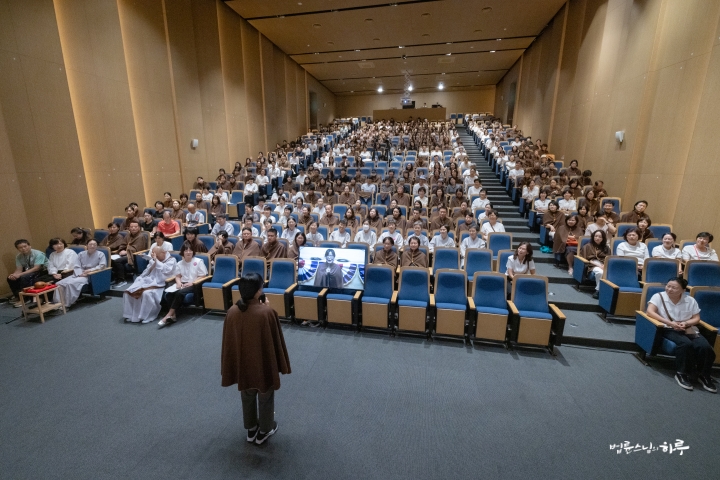
The voice of the first graduate to take the microphone was calm but firm.
“I came to reflect on how I had a lot of stubbornness and arrogance in wanting to do things my way before enrollment. I felt sorry and sympathetic toward my family members, and the words ‘diligent practice’ touched me deeply. Although it was difficult to wake up early in the morning, I saw myself changing through direct action and practice. Now I feel proud of myself, thinking that I can help someone. I am grateful for all these connections.”
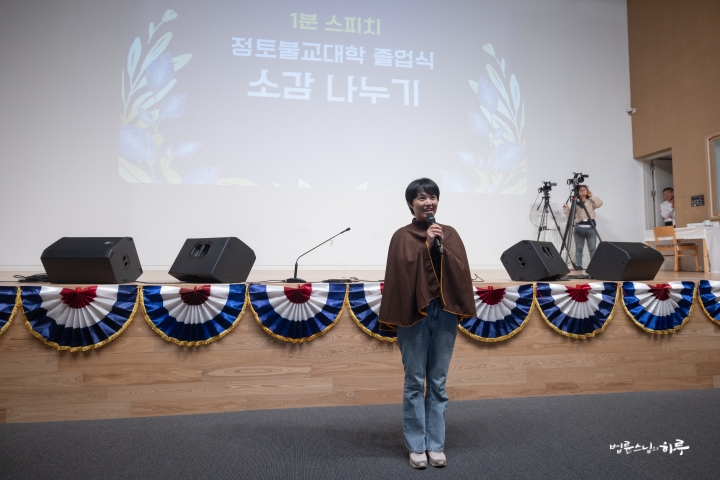
The second person to take the microphone honestly shared the weight of life felt while raising a daughter with disabilities.
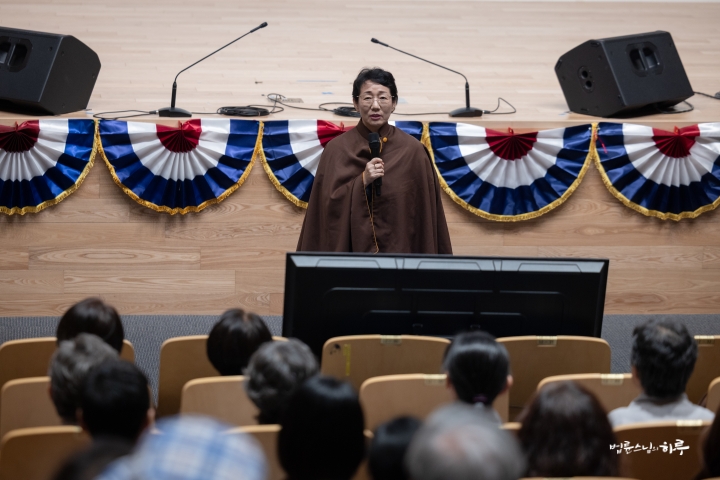
“I enrolled in Jungto Dharma School while wondering why life was so painful. I achieved my initial goal of 100% attendance, and at the Awakening Retreat, I physically embodied the teachings I had only known intellectually. As I gradually let go of the thought that I am right, I resolved to continue my diligent practice. Starting in September, I will advance to the Jungto Sutra Course to know myself better and become a person useful to the world.”
The third presenter stood before the people with a bright smile.
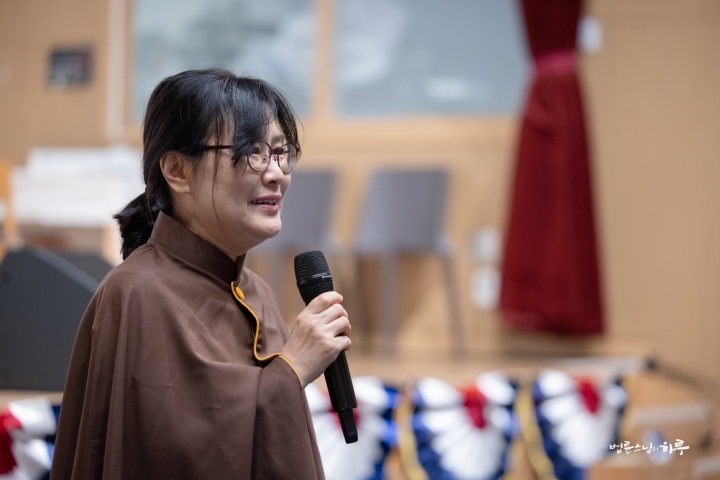
“I did everything I wanted to do and could do at Jungto Dharma School. But I realized that this was possible not just through my own efforts but through the connections and help of many people. I am deeply grateful. I will not forget this grateful heart going forward. Even if I am lacking, I will become a useful and helpful person wherever I am.”
We could feel the determination to look at oneself directly, let go of the mind, and move forward to a life of gratitude and sharing.
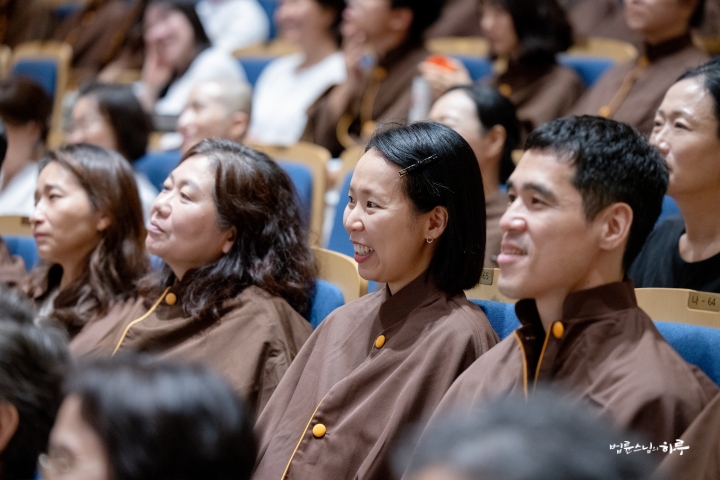
The graduation ceremony concluded with the Four Great Vows.
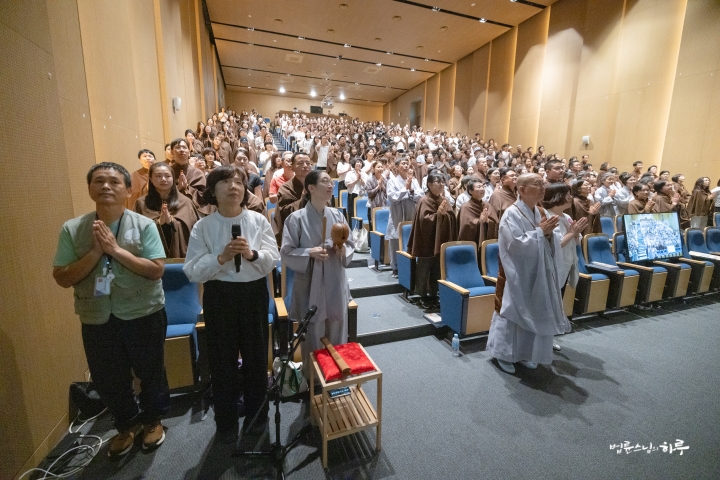
Next, there was time to take commemorative photos. Each class – weekday class, evening class, youth class, live broadcast class, basic class, etc. – came up on stage to take commemorative photos with Sunim before leaving the auditorium.
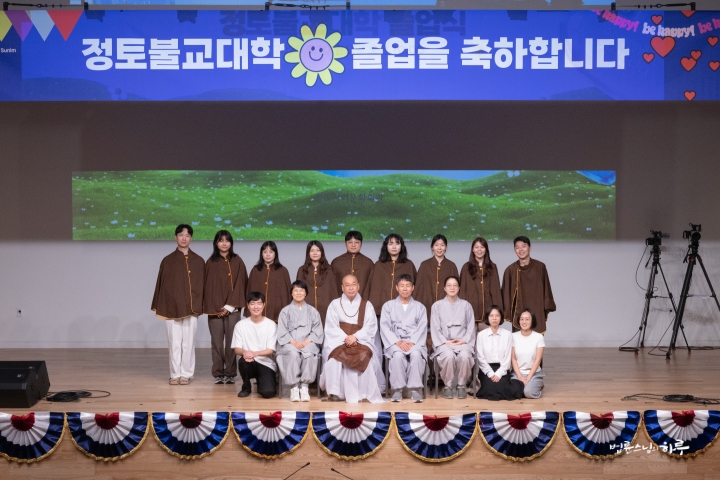
For the graduation ceremony, a photo booth was also set up in the B3 lobby. Many people commemorated today by taking photos at the photo booth after the graduation ceremony.
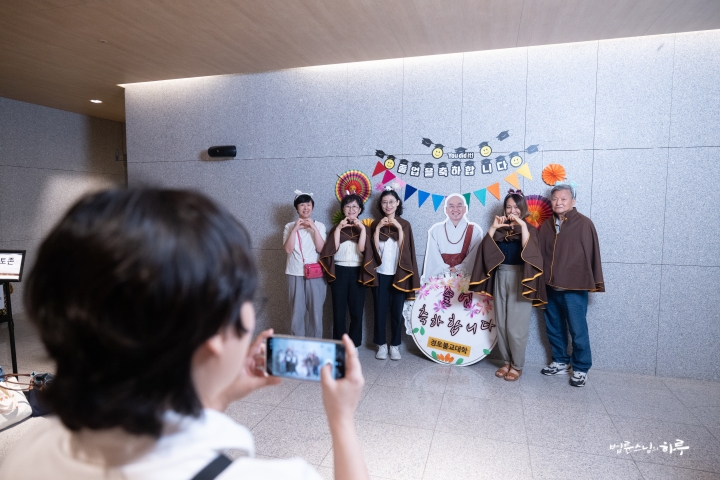
After lunch, from 2 PM, Sunim attended the Jungto Sutra Course graduation ceremony online from the broadcasting room at Jungto Center. It was a meaningful day for Jungto Sutra Course students as well, as they completed five months of study and moved toward a new beginning. Most graduates watched the live broadcast together in their classrooms, while perfect attendance and near-perfect attendance award recipients gathered in the video conference room.
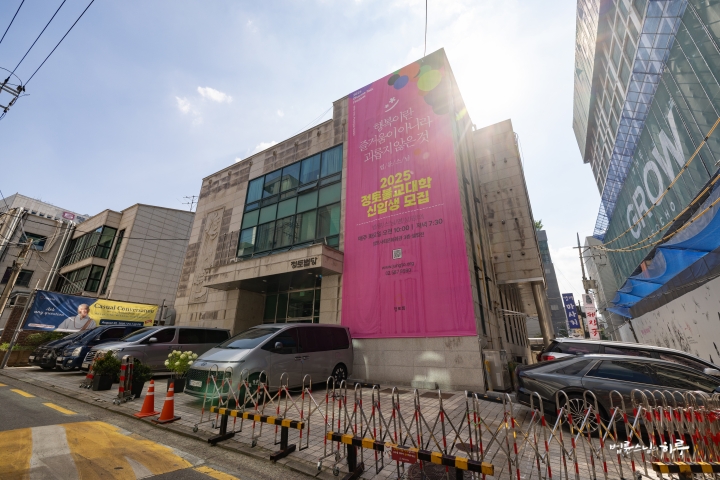
After listening to congratulatory remarks from the President of Jungto Society, everyone watched a congratulatory performance and a video of the Jungto Sutra Course activities over the past five months.
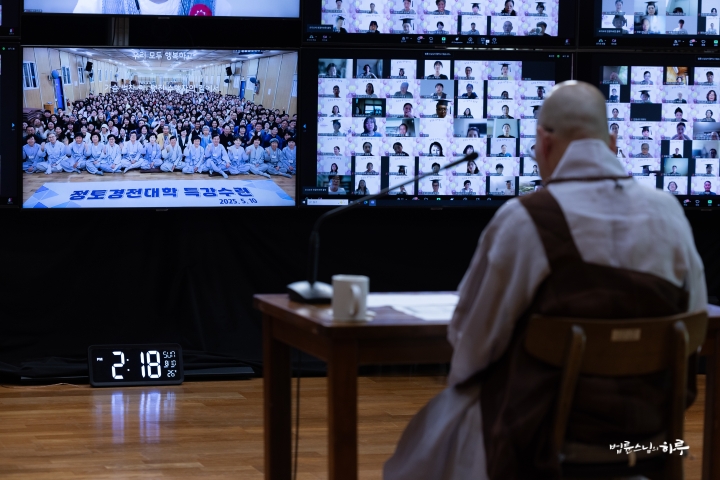
Next, Sunim, as the dean of Jungto Sutra Course, awarded diplomas to 1,100 graduates both domestically and internationally.
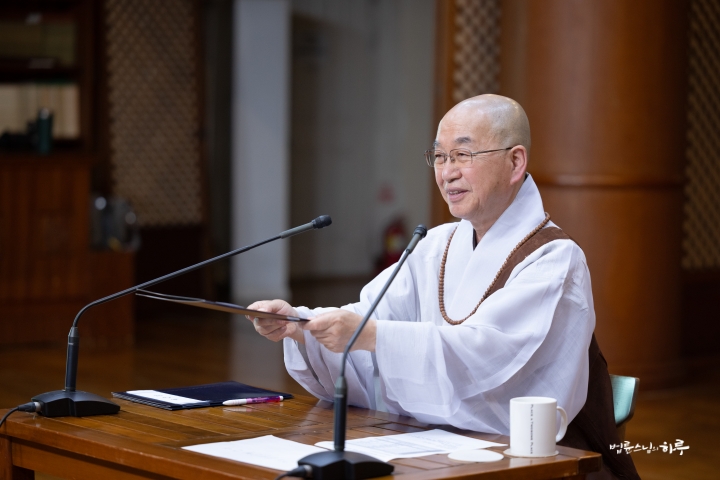
“I present you with your diploma.”
“I have received it well.”
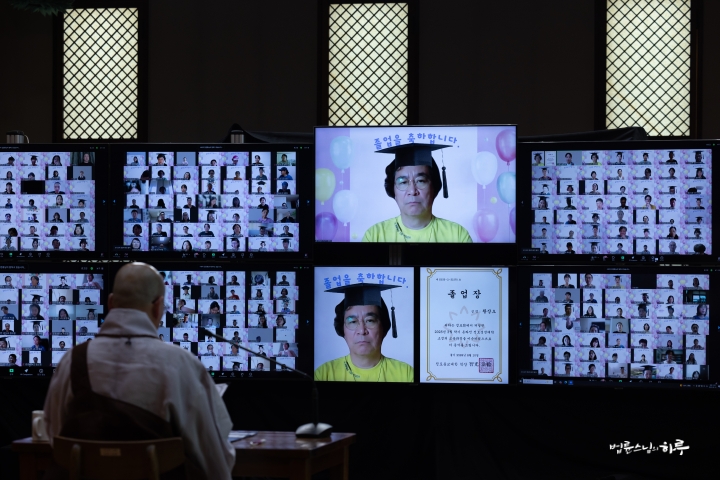
Congratulatory applause poured out from the video conference room. Subsequently, over 140 people received perfect attendance awards, and over 130 people received near-perfect attendance awards.
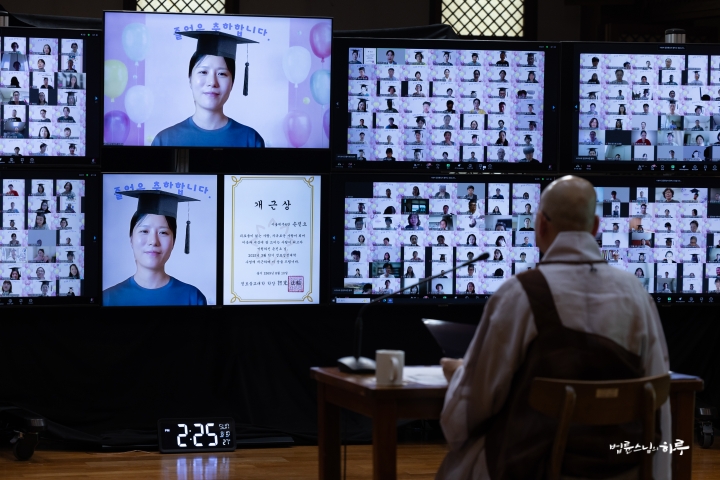
Leaving the applause behind, there was time to listen to testimonials from three graduates. All three said they were able to let go of their mental burdens and set a new direction in life through their learning.
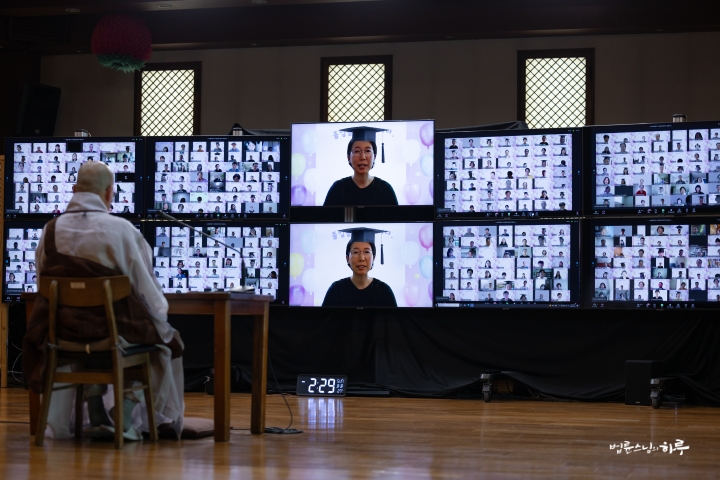
“At Jungto Dharma School, I learned how to recognize suffering, and at Jungto Sutra Course, I learned how not to be caught by suffering. Now it’s much easier to let things go with ‘oh, it’s there’ even when something bothers me. Even when complex situations arise, I have the strength to catch my breath and find my center. In situations that would have made me anxious and restless before, I can now let go and observe. Practice has given me the strength to live lightly yet firmly in both big and small moments of life. Going forward, I will move beyond a life without suffering to a life of being well-used.”
“I enrolled in Jungto Sutra Course while suffering from my wife’s unilateral divorce announcement wouldn’t subside. While learning the Diamond Sutra, I let go of the thought that ‘I must have to be happy’ and learned the teaching ‘give without expecting.’ My heart, which was full of resentment, changed to feeling ‘that’s unfortunate,’ and I felt pity thinking ‘how hard it must have been living with me.’ The wounds remain, but they don’t hurt as much now. These days, after finishing the 5:45 AM morning practice, I start my day lightly by preparing breakfast for my youngest who is now in high school.”
“Buddhism’s scientific, philosophical, and practical teachings, along with Mahayana Buddhism’s bodhisattva practice, the Diamond Sutra’s concept of emptiness, and the Platform Sutra’s Seon thought, held my wavering mind. I was deeply impressed by the culture that emphasizes not just study but also practice and community bonds. I realized that this society has never alienated me, and my loneliness and sense of alienation began to recede. I finally became the master of my world. I sincerely hope this Dharma spreads widely so that people who wander restlessly like I did can find peace of mind.”
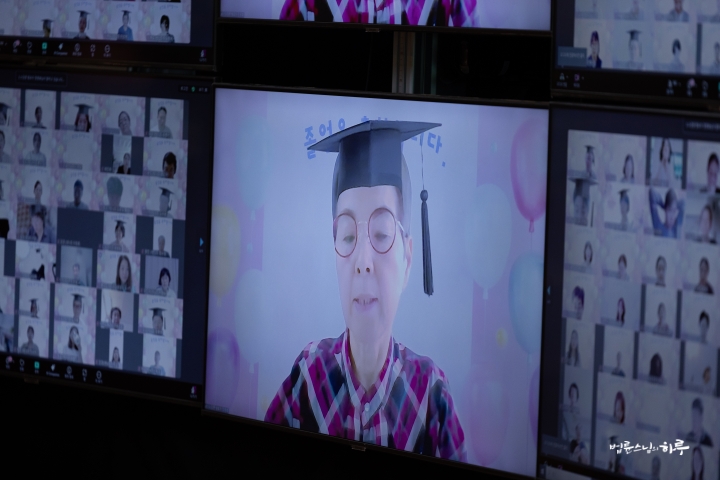
Everyone responded with great applause to the three stories of achieving mental transformation and regaining life’s center through sutra study and practice.
Next, all the graduates sang “Teacher’s Grace” together, expressing their gratitude to Sunim for guiding them with the right Dharma.
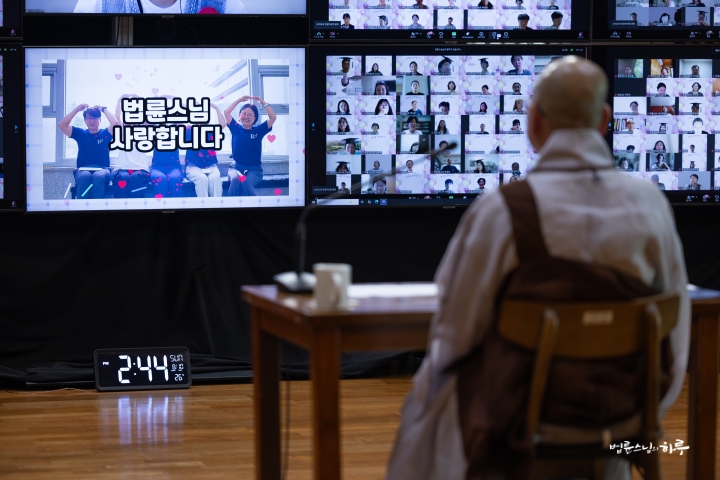
When the graduates requested the Dharma with three prostrations, Sunim gave a graduation Dharma talk. He provided detailed guidance on how to practice, give dana, and volunteer after graduating from Jungto Sutra Course.
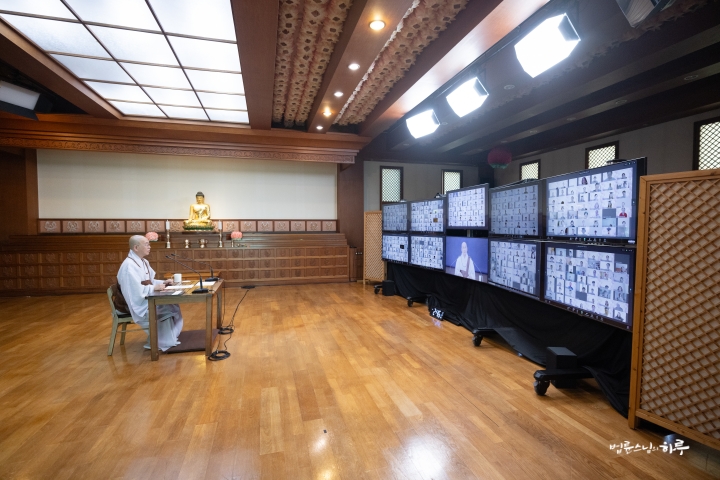
“I sincerely congratulate you on graduating from Jungto Sutra Course. I enjoyed the graduation celebration performance and testimonials. If graduating from Jungto Dharma School means opening the door to practice and taking your first step as a practitioner, completing Jungto Sutra Course means you have already taken several steps forward on the path of a practitioner.
A Practitioner’s Perspective of Looking at Life Positively
Believing that there is a capable being who can help you when you’re in difficulty, and asking that being for help to solve problems is called religion, and that belief is called faith. On the other hand, practice is realizing that the difficulties I experience arise from my own ignorance and foolishness, and freeing myself from suffering by awakening from that foolishness. Even rabbits and squirrels live on their own, so if people say they cannot live without others’ help, that’s a wrong thought. The reason I cannot be self-reliant now is not because I lack ability or have sinned, but because I am foolish. If you awaken from that foolishness, anyone can become the master of their own life and live freely. A person with this perspective is a practitioner.
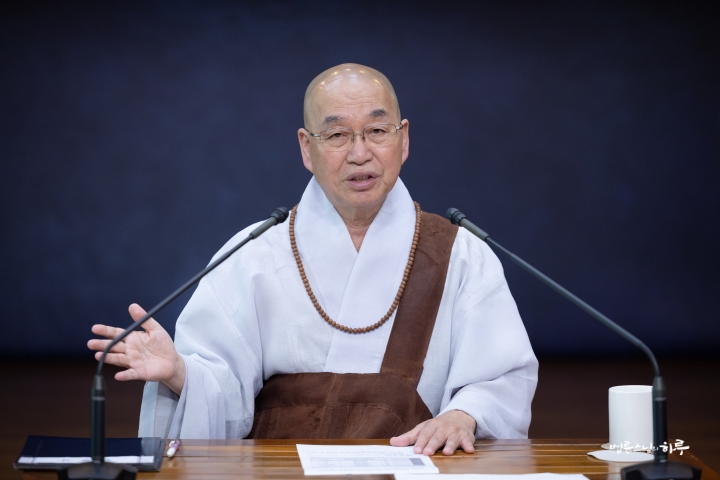
Now that you have graduated from the Sutra Course, you are no longer students but have become members of Jungto Society. You should voluntarily participate in the Awakening Retreat, and when time permits, also attend the Sharing Retreat, Meditation Retreat, and pilgrimage to the sacred sites in India. You must not forget to participate in the 1000-Day Practice and dedicate yourself to daily practice. Even though it takes some time, sleeping five hours and practicing for one hour is much better for your mental and physical health than sleeping six hours. You will be able to interact more healthily with people at work or in your daily encounters. This is because instead of constantly resenting, misunderstanding, and harboring hatred, you will view things positively with a clear and bright mind.
What’s the big deal about worldly affairs? Among those who presented their graduation reflections, there was someone who said they were angry about their divorce. For a married person, divorce might feel like a bolt from the blue, like lightning striking from a clear sky. However, from my perspective as someone who has never married, it’s not such a big deal. You live together when you’re happy with each other, and when you’re not, you live separately. What’s so extraordinary about divorce? If you want to live alone, live alone. If you want to live with someone, try living with someone else.
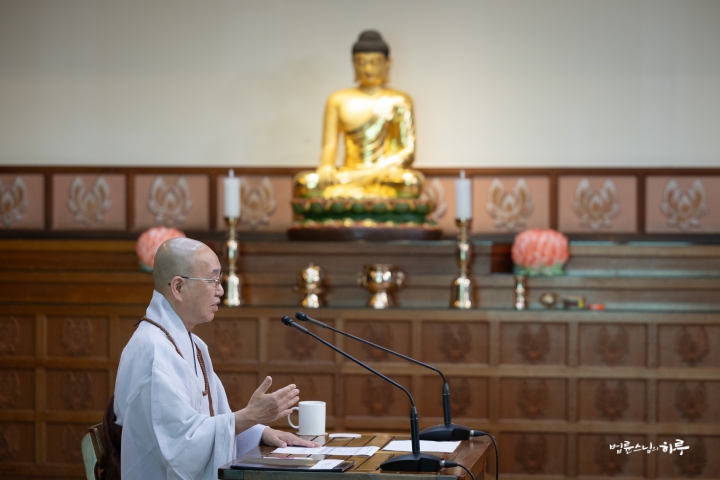
Someone once asked me how many sins I must have committed in my past life to have been married three times. I replied, ‘How much merit must you have accumulated in your past life to have experienced marriage three times when some people never experience it even once?’ I’m not encouraging multiple marriages, but rather suggesting we view what has already happened from a positive perspective. When water spills, instead of thinking ‘I’ve spilled half the water,’ we need the perspective of ‘At least half remains.’ When we fall and think ‘Oh no, I broke one leg,’ we should think positively: ‘It could have been worse if I had broken both legs, so I’m fortunate it’s only one.’ This way, no matter the situation, we can experience only temporary suffering, consider it no big deal, and get back up again.
This is the Buddha’s teaching. The Buddha and his disciples begged for food, wore discarded clothing, and slept under trees. Yet their minds were at peace. They comforted, counseled, and helped those who were suffering. Even kings who possessed everything came to the Buddha to lament their troubles, but the Buddha never once asked a king to build him a temple or give him clothes or a meal. I’m not telling you to abandon everything you have and live like the Buddha. I’m simply saying don’t suffer over matters of food, clothing, and shelter. What you have right now is more than sufficient for eating and dressing well.
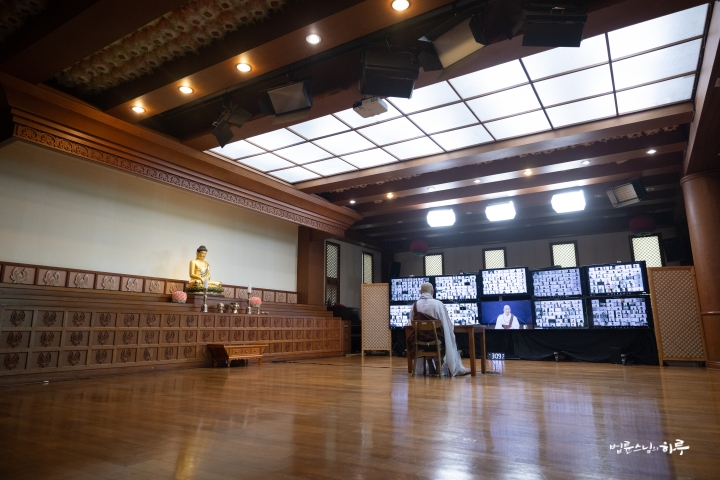
During this Northeast Asian History Tour, I hardly ever slept under the covers in my room because I was lecturing late into the night and traveling around all day. Most of the time, I just lay on top of the blanket for a moment before getting up again. So I jokingly said that I should get back about half of the hotel fee. That’s because I didn’t touch anything except for using one towel when washing my face. But it’s not like I could say I’d sleep in the hallway instead of going into the room. What matters is getting sleep wherever you are. Whether you sleep in a car or under a tree, what’s important is sleeping, not the location.
Now that you have graduated from the Jungto Buddhism Course and completed the Sutra Course, you should begin to show some qualities of a practitioner. You should have the flavor of a practitioner. This doesn’t mean you’ve become complete. While you must continue to practice on your own as you live your life, Jungto Society offers various practice programs, fellow practitioners, co-facilitators, and guides. I hope you will make good use of these programs to become a person who is free from suffering.
Practice, Generosity, and Service: Now Living the Life of a Practitioner
There is help from many unseen people that enables us to practice like this. Facilitators, co-facilitators, class coordinators, and Dharma teachers in charge – people in various roles are volunteering behind the scenes. Not a single one of them receives a salary or compensation. They are all volunteers. Even when famous singers come to perform at Jungto Society, everything is done through volunteer service. Because Jungto Society is a gathering of practitioners, we don’t hire people; everything operates through volunteer service. I hope you too will play a role like a piece of a mosaic in various activities such as cleaning the main temples, transcribing Sunim’s Dharma talks, or online volunteering.
The basic duties of Jungto Society members are three: practice, generosity, and service. First, you must become a practitioner who practices diligently every day and maintains a practice-oriented perspective. Second, you must pay membership fees, which is the minimum form of generosity, to help Jungto Society become self-sufficient. Third, you must volunteer in some way. For Jungto Society to operate without depending on others, members need to volunteer their time even when busy. Singing congratulatory songs at graduation ceremonies is volunteering, and being an MC is volunteering. You too need to contribute your talents and time bit by bit through volunteering. If you received a lot of help from facilitators and co-facilitators while studying in the Buddhism Course and Sutra Course, I hope you will reduce time spent golfing, drinking, or meeting friends, and instead dedicate your evenings or mornings to volunteering. You can also apply for leading member applicant training and receive education for one year.
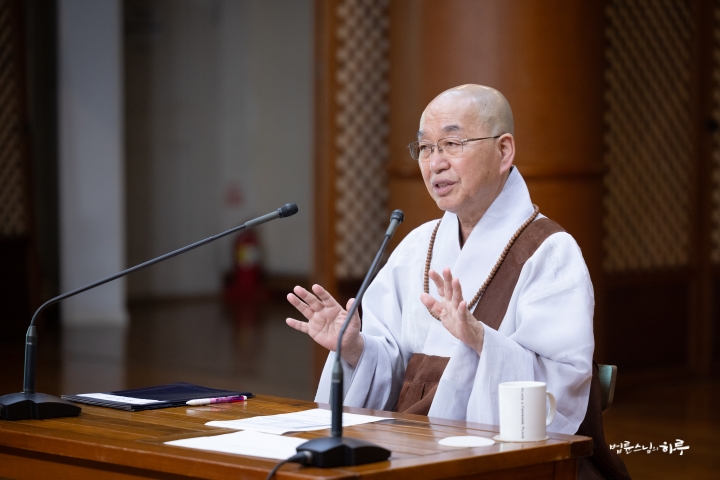
Now that you have become members of Jungto Society, you will attend the Weekly Dharma Assembly in your local area. Since Jungto Dharma School and Sutra Course classes are conducted online, it doesn’t matter if you’re in different regions. However, once you become a member, your affiliation is determined by where you live. So from now on, you will attend the Weekly Dharma Assembly with your assigned group and engage in mindful sharing with your group members. You are now participating as members, not as students.”
After the Dharma talk, graduates who were participating on-site had time to share their impressions spontaneously. When the moderator asked, “Is there anyone on-site who would like to share their graduation thoughts?” some people cautiously pressed the hand-raising button. Three graduates then took turns presenting.
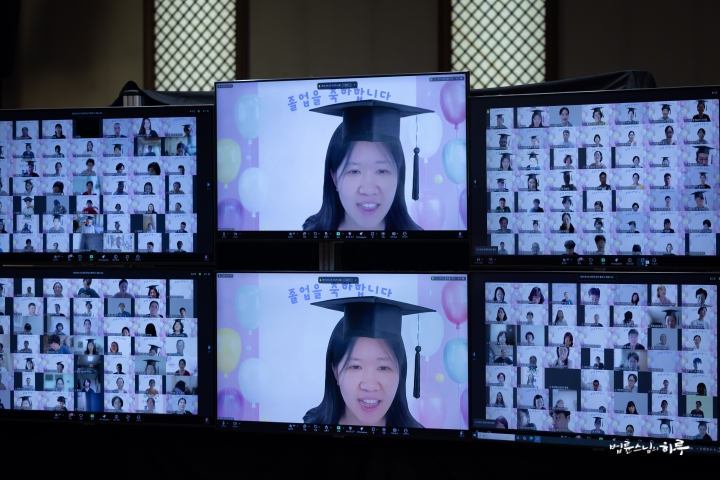
“Comparing before and after attending the Sutra Course, I can count on one hand the number of times I’ve argued with my family. As I try not to create fixed notions, my life has become freer. By seeing others as they are, I realized that my past behavior of ‘accommodating others’ actually stemmed from arrogant and selfish intentions.”
“After studying the Diamond Sutra, I deeply felt that I must accept and practice each verse with my heart. Although I had read it many times before and had many mental obstacles, I now have confidence that my desire to spread the Dharma is genuine. This graduation seems not just an ending, but ‘the beginning of being a practitioner who practices what needs to be done now.'”
“Through graduating from the Jungto Buddhism Course and Sutra Course, I’ve come to love myself more. I’m sincerely grateful that I could meet Venerable Pomnyun Sunim and learn how to love myself and others. I will continue to live loving my neighbors and others even more with a heart that loves myself.”
Although it was an online space, applause followed each presentation, and joy spread across the graduates’ faces on screen.
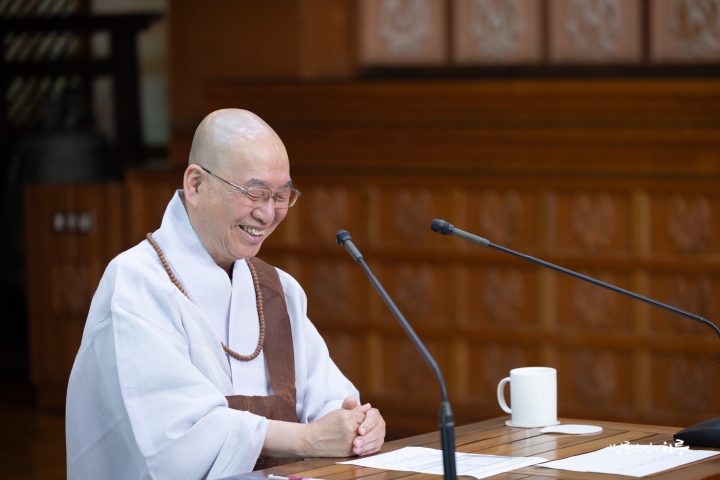
The graduation ceremony concluded with the Four Great Vows. Students entered the class website to continue mindful sharing in their respective classrooms, while Sunim left the broadcasting room.
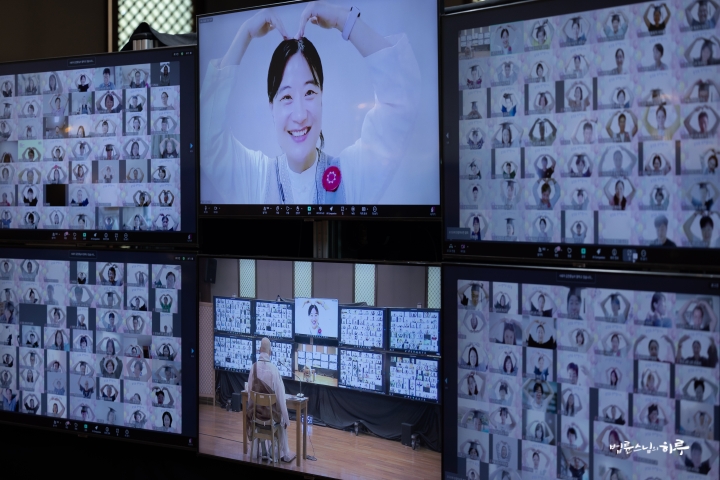
At 4 PM, a precept ceremony was held for those who had completed the leading member training over the past year to become Balsim Practitioners. The ceremony began with bell ringing, chanting, and the Heart Sutra, with about 100 people participating from the Dharma Hall on the 3rd floor of Jungto Social and Cultural Center, main temples nationwide, and online.
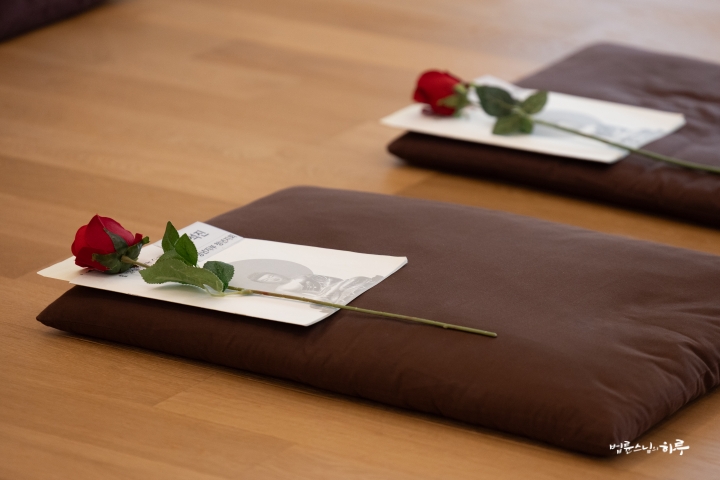
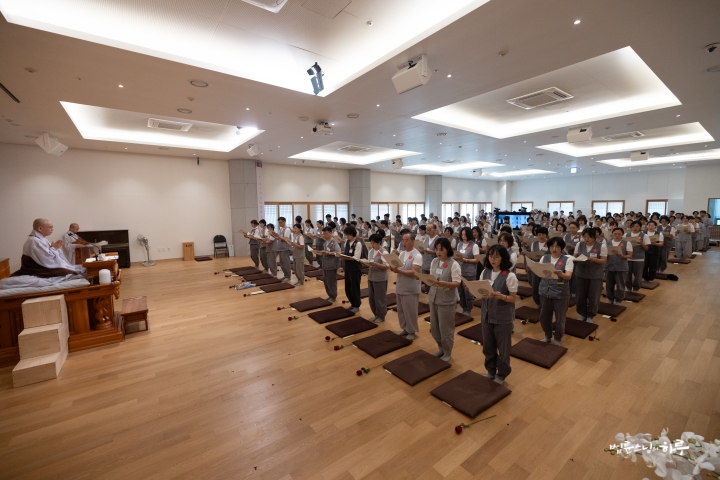
When the new Balsim Practitioners requested the Dharma with three prostrations, Sunim explained the meaning of the Three Refuges and Five Precepts, and then spoke about what practical virtues they should uphold as Balsim Practitioners going forward.
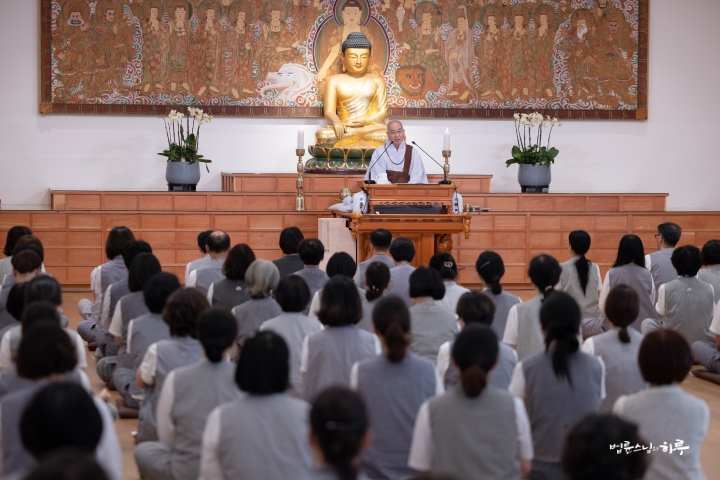
“Receiving precepts is called ‘sugye’ (受戒). Today, you are participating in a precept ceremony. Precepts (戒) mean ‘doing what should be done and not doing what should not be done.’ In the Buddha’s time, people with power would kill or oppress others, steal property, kidnap people to commit sexual assault or harassment, curse at others, deceive people, and cause trouble while drunk. In such a world, those who heard the Buddha’s Dharma and awakened as if waking from a dream to become monastics would abandon their positions even if they were kings, abandon their wealth even if they were rich, leave their families and homes to beg for food from others’ houses, wear discarded clothes, and sleep under trees.
Would someone who had given up everything and lived under trees have any reason to hit others, steal others’ belongings, sexually harass others’ women, curse, commit fraud, or cause drunken disturbances? No, they wouldn’t. That’s why there were no precepts initially. When someone truly awakened and became a monastic, precepts weren’t necessary. So the initial precepts weren’t created for monastic practitioners. When someone wanted to become a monastic, they would simply be told, ‘Come, bhikkhu. The Dharma is well explained here, so practice diligently.’ That was all. There were no procedures or promises, and naturally no precept ceremonies.
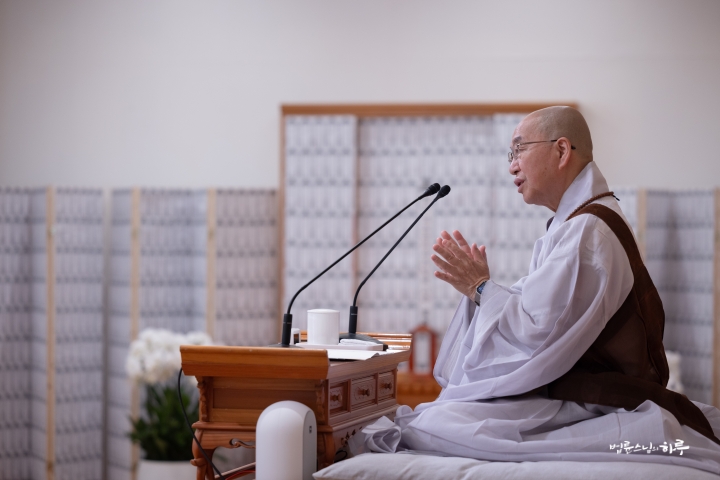
However, there were cases where people, though moved by the Buddha’s teachings and wishing to become monks, could not immediately abandon their homes and leave their families to live in the forest. Strictly speaking, this could be seen as a lack of complete enlightenment, but there were people whose practical circumstances simply didn’t allow it. Some were too old, and women in particular had no environment whatsoever that would enable them to live outside. The risk of being seized by strange men and sexually assaulted while traveling was very high.
Five Essential Vows for Lay Practitioners
So then, is it possible to practice while remaining at home, maintaining one’s social status, property, and family relationships, and having a job? Such people are distinguished from monastic practitioners and called “lay practitioners.” They have the same mindset as monastic practitioners but practice at home because circumstances prevent them from becoming monks. The Buddha permitted this, but he attached conditions. If someone holds a position in society—for example, a king or warrior—they are likely to hit or kill others according to worldly customs. In the past, we too thought that school teachers had to use corporal punishment on children. Not only teachers but parents also believed they had to hit children to teach them. So it was expected that people in secular life would end up hitting others. Also, when doing business in the world, there’s a possibility of taking or stealing from others for one’s own benefit, and in married life, one’s eyes might wander to other people. When conversing with others, one might use profanity or tell lies. Thus, lay practitioners, unlike monastic practitioners, are in an environment that makes practice difficult. That’s why precepts were established as the minimum standards that must not be violated.
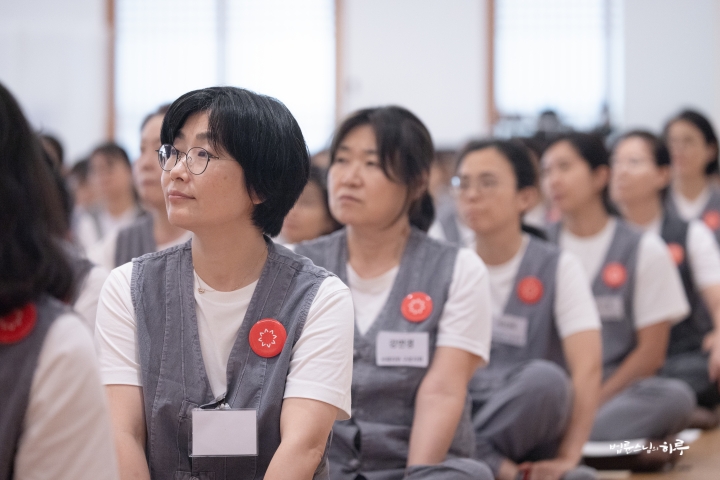
To become a lay practitioner, one must observe at least five precepts. First, under no circumstances should one hit or kill others. No matter if someone is a king or holds any position, if they hit or kill people, they cannot be called a lay practitioner. This doesn’t mean they shouldn’t become a Buddhist follower, but rather that they cannot be a practitioner. Second, one must not steal or take what belongs to others. If someone thinks they have no choice but to take things, they also cannot become a practitioner. Third, one must not sexually harass or assault others. Whether married or single, if someone acts on their desires through sexual harassment or assault against another’s will, they cannot be called a practitioner. Even with consent, one must not have relations with minors or people who have spouses. Fourth, under any circumstances, one must at least refrain from lying and using abusive language. Those who use abusive language and tell lies cannot be called practitioners. Fifth, one must not harm others while intoxicated. While it’s best not to drink alcohol at all, even if one does drink, they should refrain from becoming drunk and causing disturbances or raising their voice. Someone who says, ‘I talk too much because I’ve had a bit to drink’ cannot be called a practitioner.
Only by observing these five precepts can one truly be called a practitioner. Today, by receiving these precepts, you have entered this category. So what should you do if you break a precept? If you break it unconsciously out of habit, you must repent immediately upon realizing your mistake. However, if you break it knowingly, you are not qualified as a practitioner. When someone says, ‘You have broken a precept,’ if you respond with ‘I’m only human, how can I keep all of them?’ then you are not qualified as a practitioner. In such situations, you should acknowledge it by saying, ‘I’m sorry. I overlooked it.’ A practitioner is someone who, when unknowingly breaking a precept while trying to observe them, immediately repents and strives to return to the original state. Conversely, if someone dismisses it thinking ‘This much is okay,’ they are merely an ordinary person who has given up the path of a practitioner.
Facilitators Teach Through Life, Not Words
You have now established the fence of precepts that requires you to observe at least these five precepts without fail. This fence is meant to protect practitioners on the path to happiness for both oneself and others, and toward liberation and nirvana. If you simply come to Jungto Society to volunteer and make offerings, you don’t necessarily have to observe these precepts. However, it’s different for facilitators who lead classes and guide students. It doesn’t make sense to teach students that ‘practice is good, volunteer and make offerings’ while you yourself don’t do morning practice, make offerings, or volunteer. Students’ interest and participation in practice vary depending on the facilitator’s character and sincerity.
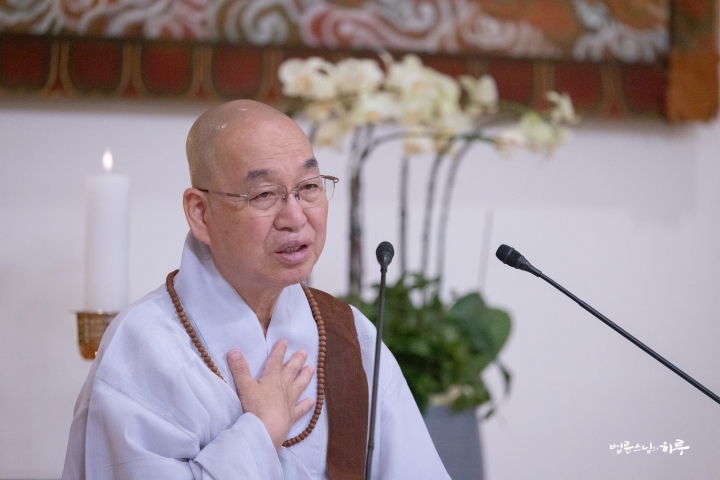
You must have felt how the atmosphere changes depending on the facilitator. While the Buddha was great, we cannot meet him directly as he has passed away, so we hear the Dharma through Sunim. However, even Sunim’s Dharma talks cannot be heard every day. The person who stands before students at the Jungto Dharma School is the facilitator. Beginners are greatly influenced by the facilitator. While you who know Jungto Society well might think ‘The facilitator is somewhat lacking’ and let it pass, beginners cannot do so.
Leading members must make time to prepare weekly classes and manage and evaluate students, so it’s difficult for regular office workers to do this. Still, if someone has volunteered to do it, they shouldn’t say they don’t have time. In such cases, it’s better to quit. Also, since leading members have become Korean Minutemen for Peace and Unification with the goal of peaceful unification of the Korean Peninsula, they must be mentally prepared to carry out this mission in perfect order.”
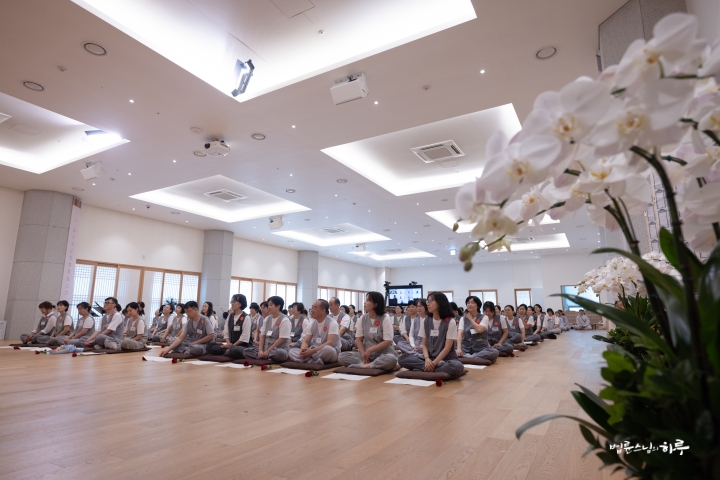
This was followed by repentance, offerings, and the precept-taking ceremony.
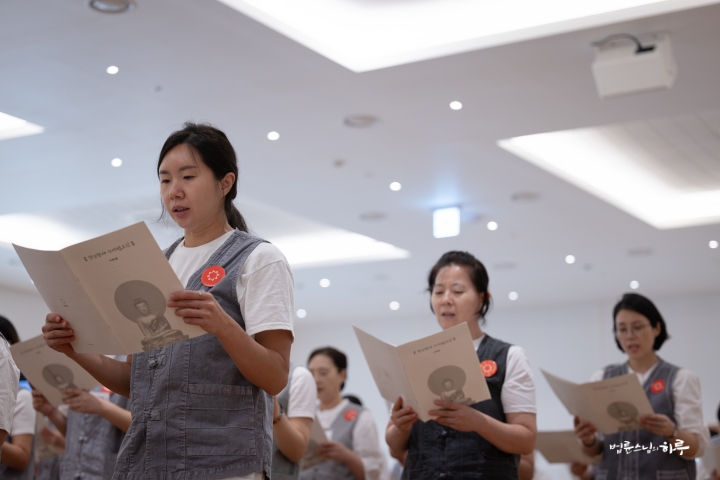
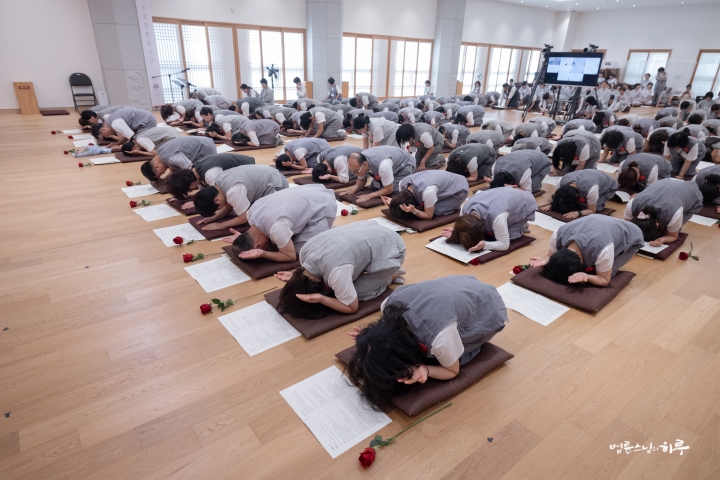
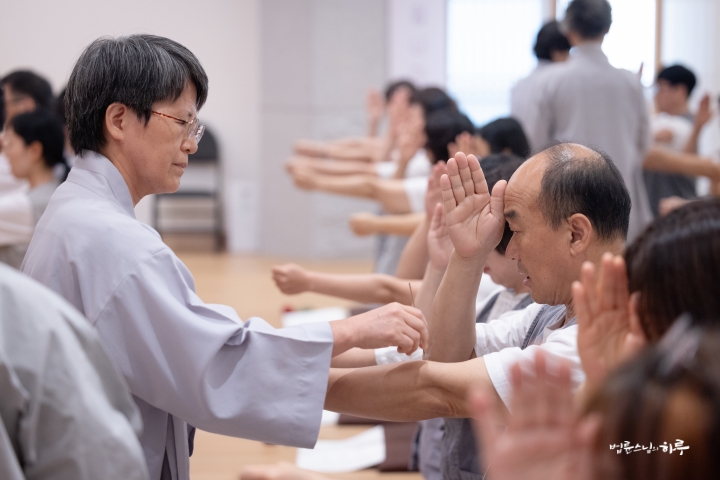
Those who pledged to uphold the five precepts came forward to the altar to offer flowers.
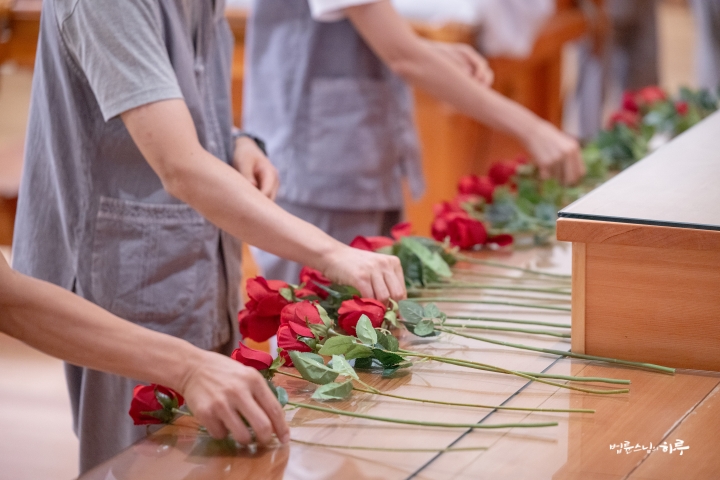
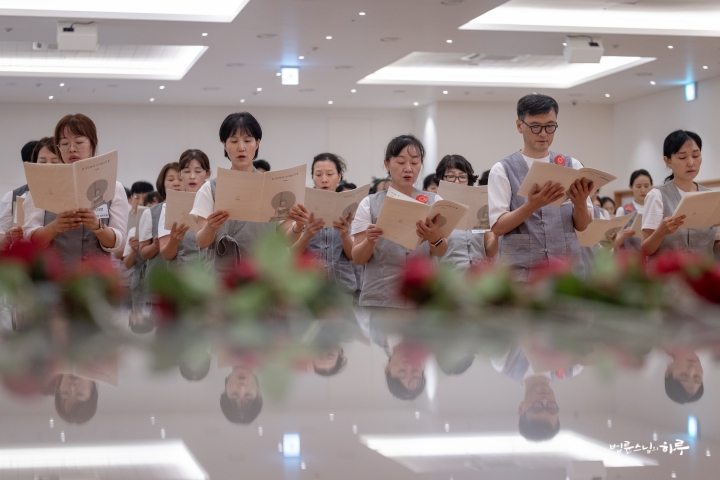
Sunim offered a heartfelt prayer for the Balsim Practitioners who were making a new beginning as lead volunteers.
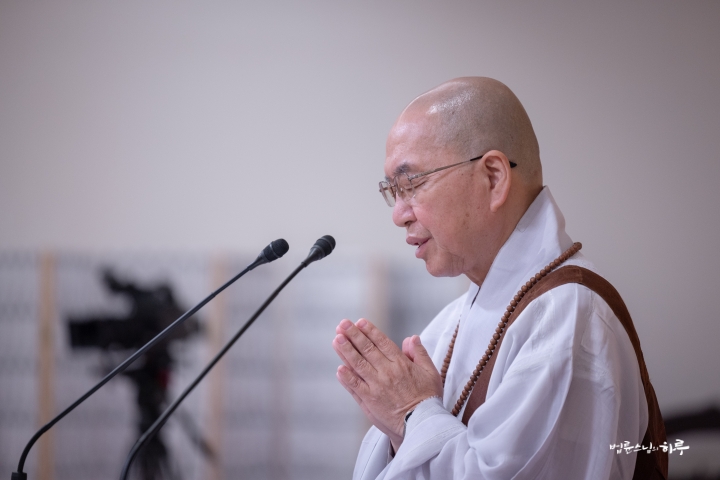
“Today at Jungto Society, 109 Balsim Practitioners who have completed the Jungto Buddhism Course and Sutra Course, entered the 1000-Day Practice to dedicate themselves to practice, completed the Awakening Retreat, and faithfully finished the lead volunteer training and Tongil Euibyung training, have made a great aspiration saying, ‘We will continue to practice diligently until we attain Buddhahood in the future.’ Today they have received the five precepts given by the Buddha, vowing not to engage in foolish actions that harm others and themselves, and furthermore, to lead a wise life that benefits both others and themselves. This is truly a precious occasion, and we all praise and celebrate it.
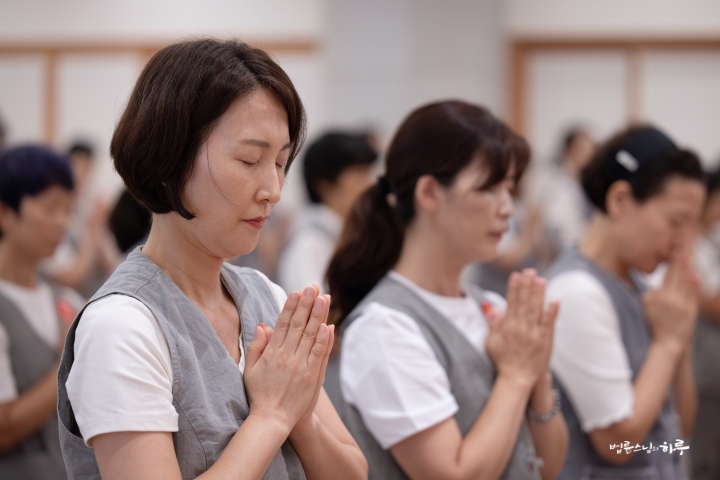
However, even with such great aspiration today, when faced with reality, there will be times when they forget these precepts and return to their old ways of living as ordinary beings. At such times, may Avalokitesvara Bodhisattva, not forgetting the original vow and with compassion, always watch over them so they may realize their foolishness and return to the path of practitioners. When they forget today’s vow and, preoccupied with survival, turn away from the suffering of sentient beings, may Ksitigarbha Bodhisattva, not forgetting the original vow, protect and awaken them so they may return to their original aspiration.
We dedicate the merit of today’s vows and precept-taking to all sentient beings. May all suffering beings be freed from their suffering. We dedicate the merit of today’s precept-taking and vows to the Korean Peninsula. May lasting peace without war be achieved, and may our North Korean compatriots soon be freed from suffering and live free and happy lives. We also dedicate today’s merit to our departed ancestors. Through this merit, may all ancestral spirits be freed from the realms of hell, hungry ghosts, and animals, and be reborn in the Pure Land.”
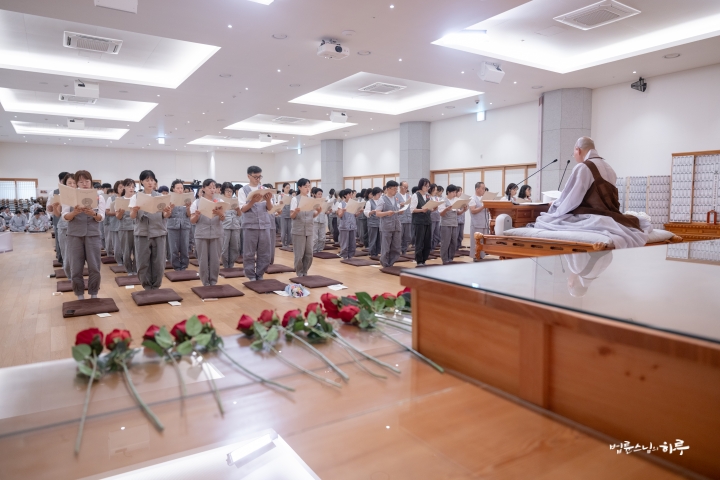
Next, the precept certificates were presented. Sunim presented a certificate to one representative on behalf of all recipients.
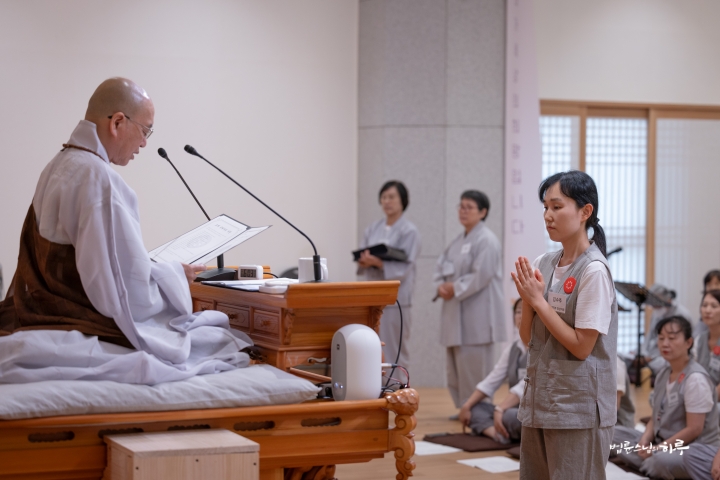
Then, the Dharma Teachers presented certificates to each person individually.
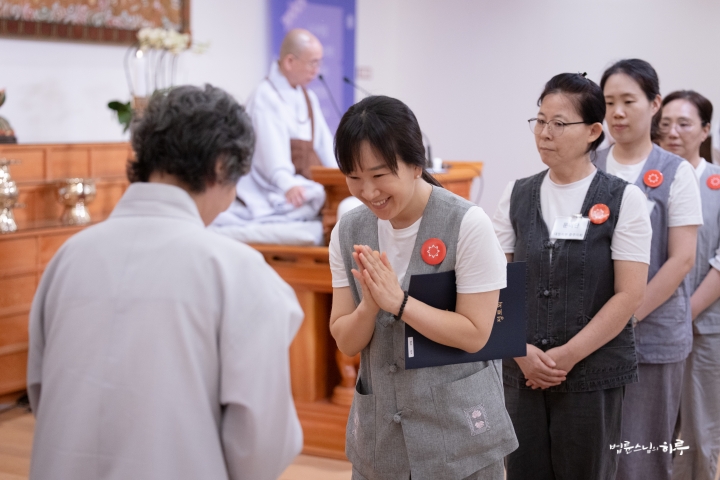
After all precept recipients received their certificates and were seated, Sunim explained the meaning of receiving a Dharma name and offered words of encouragement to the precept recipients.
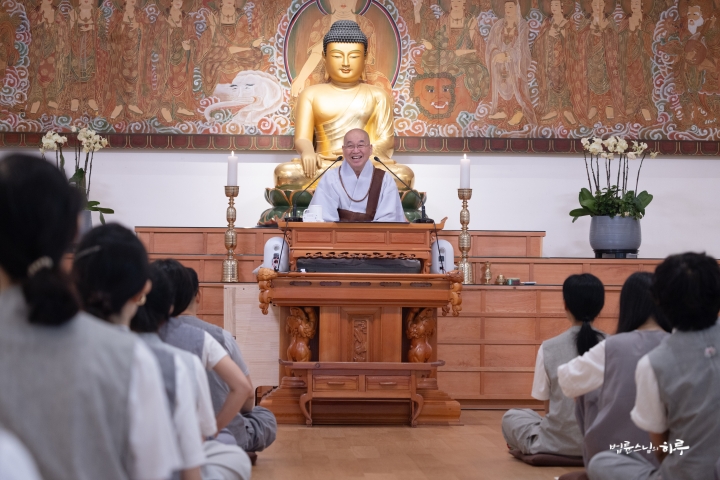
“Now that you have become practitioners, you will receive a Dharma name. A Dharma name is the name you will have when you become a Buddha in the future. Not now. For example, if you receive the Dharma name ‘Beopryun,’ your future Buddha name will be ‘Beopryun Buddha.’ Since you are not a Buddha now, you will be called Beopryun Sunim, Beopryun Bodhisattva, or Beopryun lay practitioner. However, this is from the perspective that you will become Beopryun Buddha in the future. Strictly speaking, those of you who have completed today’s precept ceremony have become members of the Buddha Club – a gathering of aspirants who vow to become future Buddhas. Therefore, you should have both pride and a sense of responsibility.
For example, if someone asks, ‘Could you please do this?’ you might refuse, saying ‘I’m too busy.’ However, if someone says, ‘Bodhisattva Suseunghaeng, could you please do this?’ you should respond, ‘Yes, I understand.’ When called by your Dharma name, you should be aware that ‘I am a Buddha’ or ‘I am someone who has vowed to become a Buddha.’ Since calling a Buddha’s name is itself chanting the Buddha’s name, the person calling also gains merit from this practice. Because all Dharma names are Buddha names, the caller accumulates merit, and the one being called gains self-awareness.
You have now become core members of Jungto Society. Jungto Society is sustained by your practice, generosity, and volunteer service. From now on, please engage in activities with pride as core volunteers of Jungto Society.”
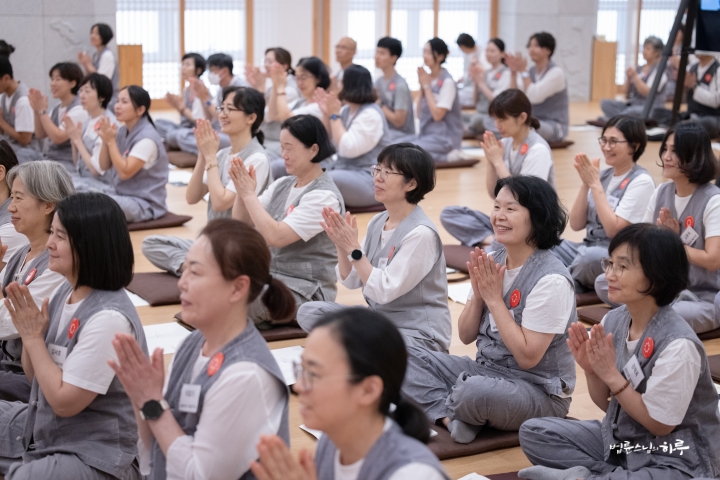
After completing the ordination ceremony with the Four Great Vows, everyone took a commemorative photo together.
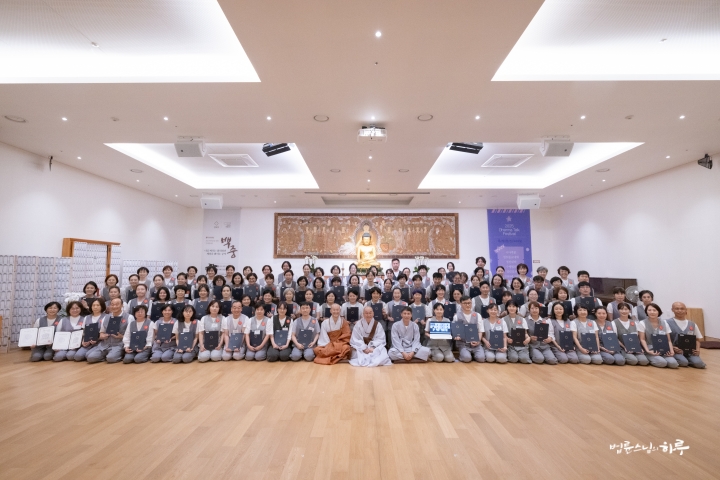
The newly ordained Balsim Practitioners continued sharing their reflections in the second part of the program.

At 6:30 PM, Simon, Director of External Affairs, and Dr. Hiro from the International Buddhist Confederation (IBC) in India came to visit Sunim. Sunim warmly greeted them and engaged in conversation.
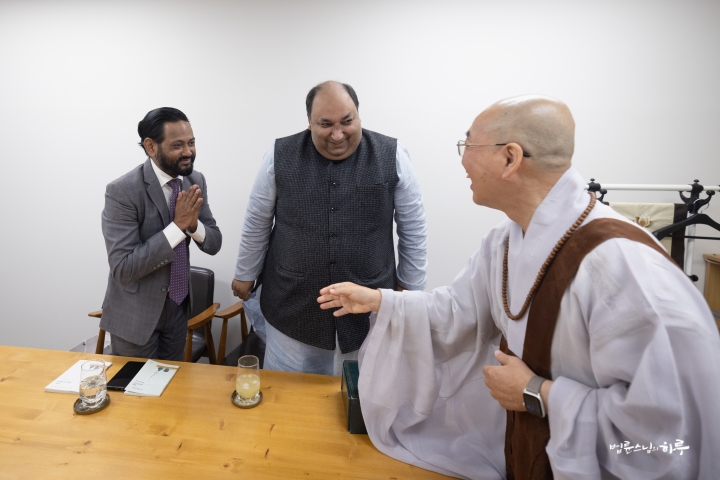
They requested that Sunim attend the Global Buddhist Summit, which is being prepared with the participation of world-class Buddhist leaders.
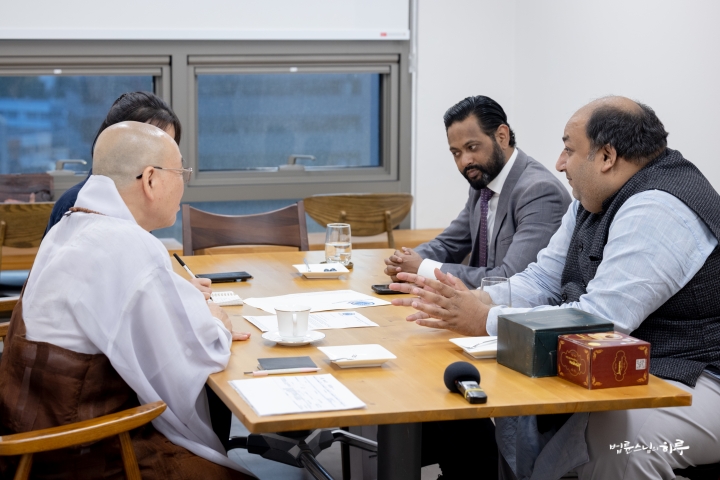
“The Global Buddhist Summit is a conference where Buddhist leaders from around the world gather to seek solutions to major issues facing modern society (climate crisis, conflict, ethics, peace, sustainable development, etc.) based on Buddhist teachings and values. It will be held for two days from January 24-25 next year in New Delhi, and we would very much like to invite you.”
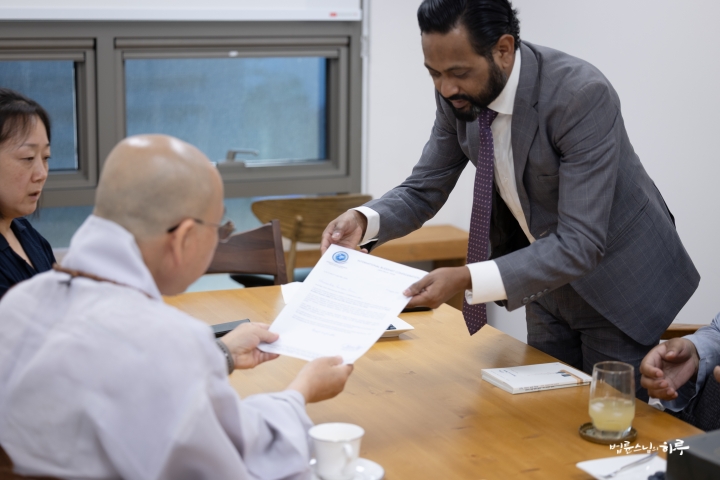
Sunim checked his schedule and responded.
“I’m afraid it will be difficult for me to attend due to time constraints. From January 22, I need to guide a pilgrimage to India’s sacred sites with about 500 participants.”
“Could you at least come for the opening ceremony on January 24?”
“Since there are flights from Varanasi or Bodh Gaya to New Delhi, let me check if I can adjust my schedule briefly to attend. Thank you for the invitation.”
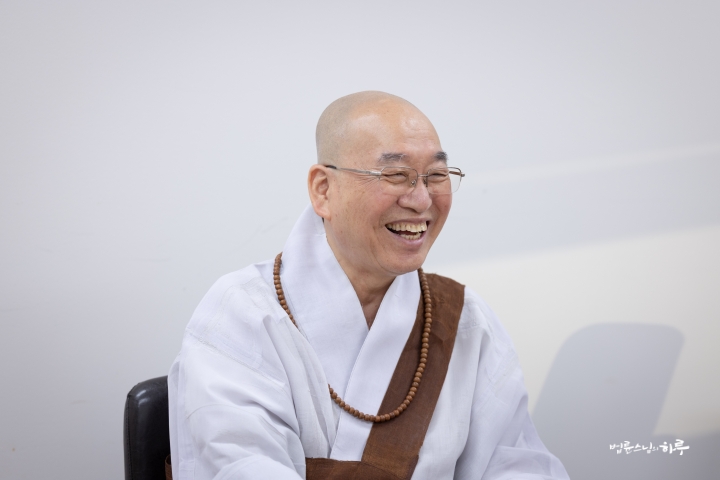
The two visitors also provided valuable advice regarding the difficulties Sujata Academy is facing with Foreign Contribution Regulation Act (FCRA) registration. Sujata Academy is operated by JTS for untouchable children near Gaya in Bihar State, India. They also discussed building a Dhamma center for Indians in Sankasia.
After conversing for over an hour, Sunim presented small gifts to the two visitors. They also gave Sunim a small Buddha statue and tea as gifts.
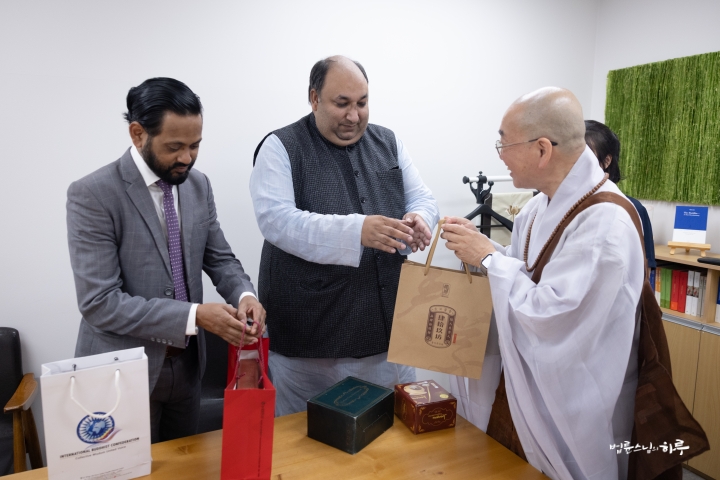
“Thank you for always showing interest and helping us.”
They took a commemorative photo together and promised to meet again.
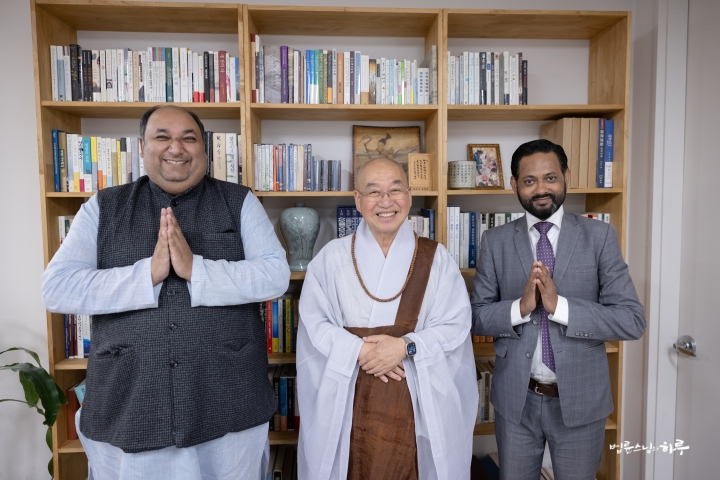
After seeing off the guests, Sunim departed from Seoul at 8 PM and headed to Dubuk Jungto Retreat Center.
After driving on the highway for 3 hours and 30 minutes, he arrived at Dubuk Jungto Retreat Center at 11:30 PM, concluding the day’s activities.

Tomorrow morning, Sunim will visit Cheonryongsa Temple on Namsan Mountain in Gyeongju with the community’s Dharma Teachers to discuss how to proceed with the reconstruction project starting next year. In the afternoon, he will meet with members of the Peace Foundation Planning Committee who are visiting Dubuk Jungto Retreat Center.




